HANDBOOK FOR INTERNATIONAL STUDENTS
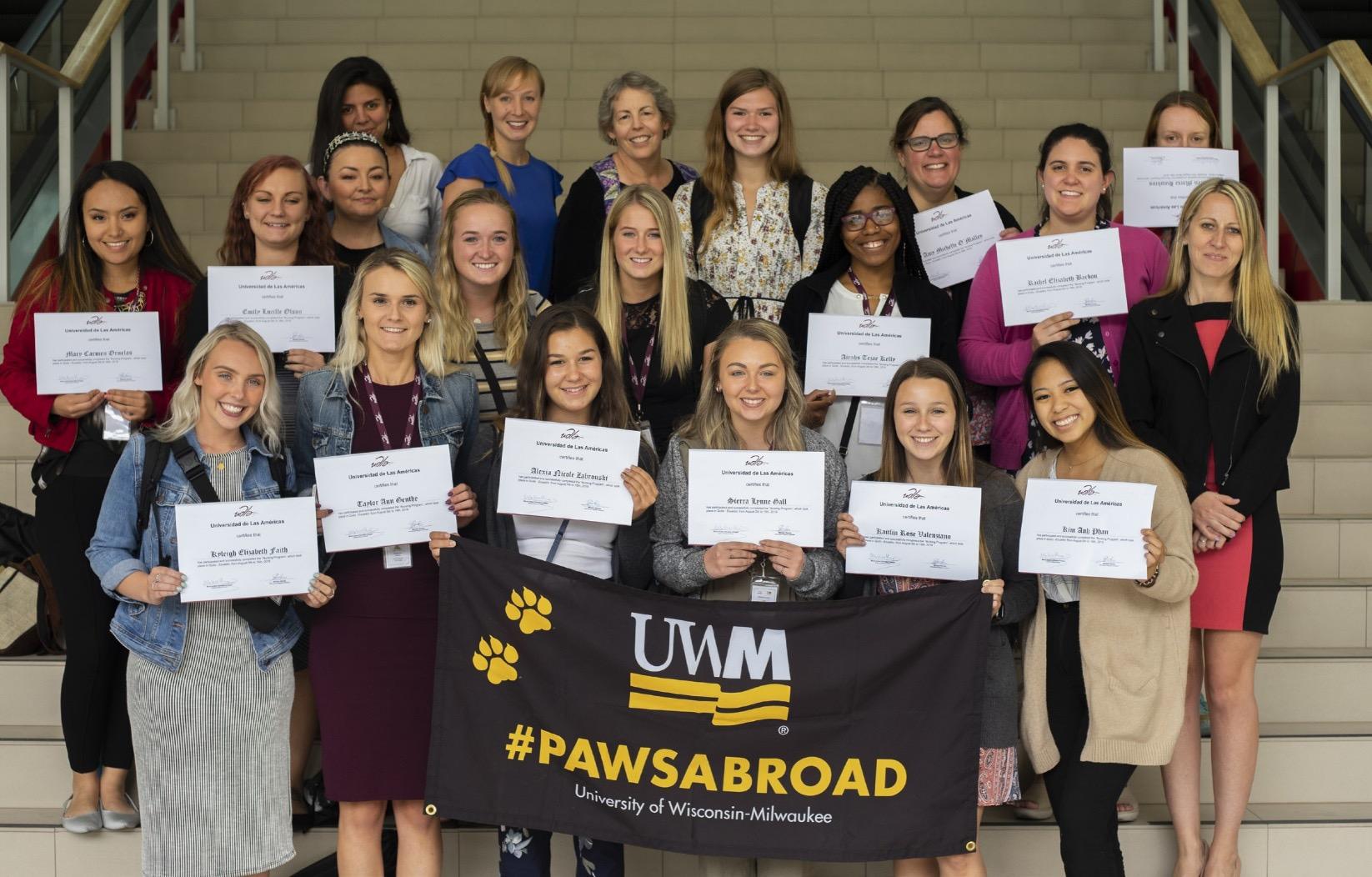
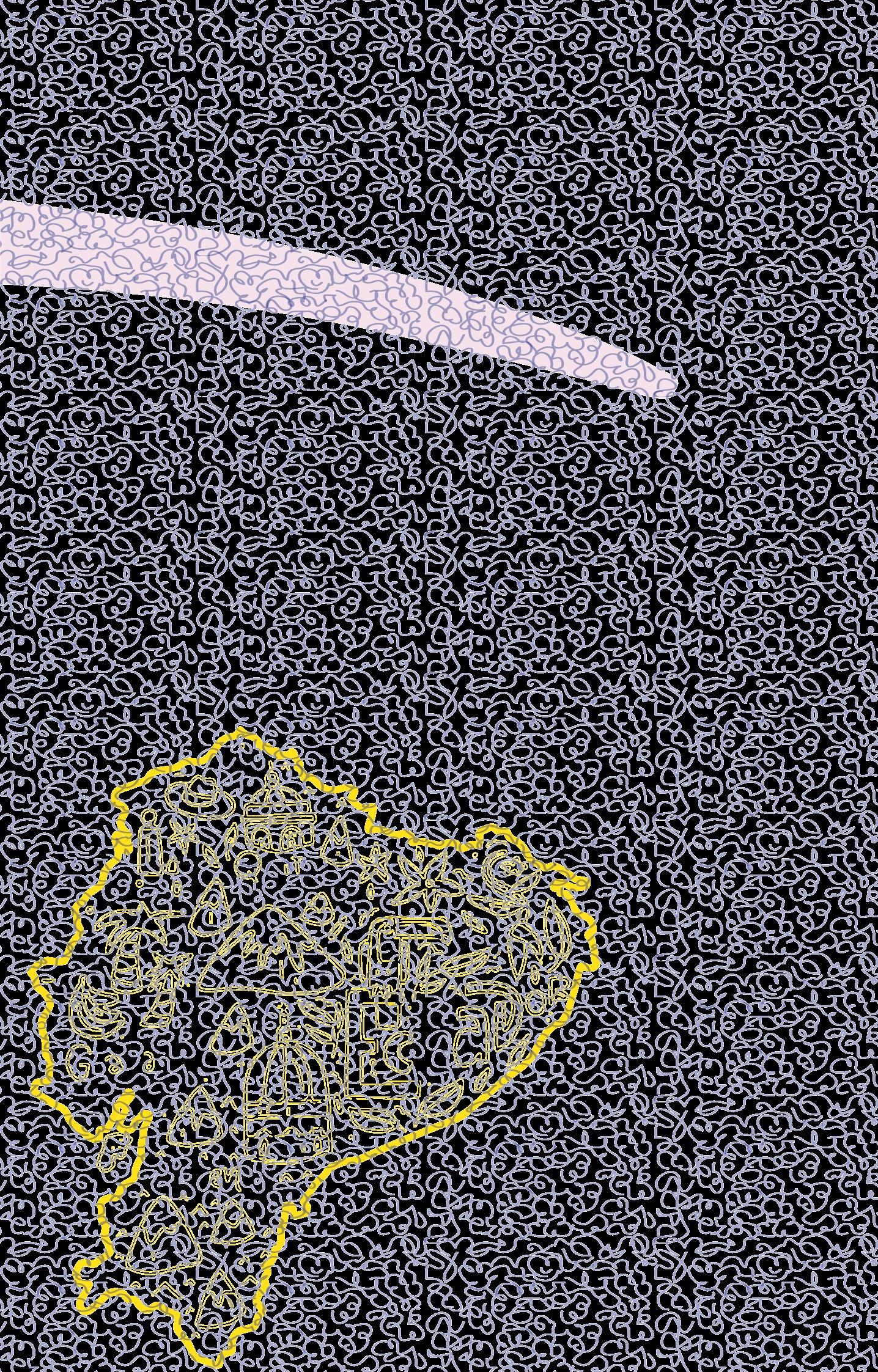

2 HANDBOOK FOR INTERNATIONAL STUDENTS INDEX WELCOME MESSAGE 5 GET TO KNOW ECUADOR 6 LOCAL CURRENCY 7 ABOUT QUITO 8 PACKING LIST 10 CLIMATE IN QUITO 11 CLOTHING 11 HIGHLAND REGION 12 AMAZON REGION 13 COAST AND INSULAR REGIONS 14 AIRPORT 15 TYPE OF TRANSPORTATION 15 ACCOMMODATION 16 BUDGET 16 STUDENT VISAS 17 SEMESTER EXCHANGE 17 SHORT COURSES / RESEARCH INTERNSHIPS 18 VACCINES 20 INTERNATIONAL MEDICAL INSURANCE 20 EXCLUSIVE MEDICAL COVERAGE FOR INTERNATIONAL STUDENTS 20 ACCIDENT INSURANCE FOR UDLA STUDENTS 22 PROCEDURE IN CASE OF EMERGENCIES OR ACCIDENTS 23 MEDICAL APPOINTMENTS 23 SECURITY 24 GASTRONOMY 25 TOURISTIC PLACES IN QUITO 26 GREEN AREAS – PARKS 28 INFORMATION OF INTEREST ABOUT QUITO 32 LAND TRANSPORTATION TERMINALS 35 TRANSPORTATION BETWEEN UDLA CAMPUSES 35 SUPERMARKETS AND MUNICIPAL MARKETS 36 PHARMACIES 36 ARTISAN MARKET OF QUITO 36 SHOPPING MALLS 37 MOVIE THEATERS 37 SPORTS 37 ACTIVITIES CLOSE TO QUITO 38 ACADEMIC INFORMATION 42 UDLA EXCHANGE PROGRAM 42 61
3 COMMUNITY ENGAGEMENT PROJECTS 61 INFRASTRUCTURE 43 STUDENT SERVICES 45 LIBRARY SYSTEM 45 UDLA CLUBS 46 MY CAMPUS PRINT 46 DOCTOR’S OFFICES 47 CAFETERIAS 48 AVAILABLE CAFETERIAS 48 ADDITIONAL SERVICES FOR THE UDLA COMMUNITY 49 BANNER 49 ACADEMIC SCHEDULE (CLASS REGISTRATION) 50 CURRENT ACADEMIC OFFERING 51 SCHOOL OF GASTRONOMY 51 SCHOOL OF MUSIC 51 SCHOOL OF PSYCHOLOGY 51 COLLEGE OF ARCHITECTURE AND DESIGN 51 COLLEGE OF ECONOMICAL AND ADMINISTRATIVE 52 SCIENCES 52 COLLEGE OF HEALTH SCIENCES 52 COLLEGE OF COMMUNICATIONS AND AUDIOVISUAL ARTS 52 COLLEGE OF LAW 52 COLLEGE OF ENGINEERING AND APPLIED SCIENCES 52 COLLEGE OF DENTISTRY 53 COLLEGE OF MEDICINE 53 COLLEGE OF GENERAL TRAINING 53 SCHOOL OF HUMANITIES 53 ENGLISH LANGUAGE SCHOOL 55 FRENCH 56 SCHOOL OF PHYSICAL SCIENCE AND MATHEMATICS BASIC MATHEMATICS 56 CALCULUS AND ALGEBRA 57 STATISTICS 57 PHYSICS 57 GEOMETRY 57 LANGUAGE LEVEL 57 SCHOOL OF POLITICAL SCIENCES AND FOREIGN RELATIONS 58 SCHOOL OF HOSPITALITY AND TOURISM 58 SPANISH COURSE 58 COURSES IN ENGLISH 58
COMMUNITY ENGAGEMENT 61 COMMUNITY ENGAGEMENT PROJECTS 61 ACADEMIC ASSESSMENT 61 ATTENDANCE POLICY 62 EXAM RECOVERY POLICY 62 GRADE RANGE AND EQUIVALENCES 62 MODIFICATIONS TO THE ACADEMIC WORKLOAD 63 ABSENCE JUSTIFICATION 63 EARLY TERMINATION OF THE EXCHANGE PERIOD 63 ADDITIONAL EXPENSES DURING THE EXCHANGE 63 SPANISH SCHOOL 65 UDLAMIGOS- BUDDY PROGRAM 66 MICROSOFT 365 VIRTUAL TOOLS 67 ONLINE EDUCATION / VIRTUAL CLASSROOM 67 MICROSOFT TEAMS 68 BANNER SELF-SERVICE PORTAL 68 JOB BANK PLATFORM 69 UDLA +APP 69 LEARNING AND SUPPORT CENTER 70 UDLA MENTOR 70 STUDENT WELLBEING 71 SYSTEMS - IT SUPPORT 71 SECURITY SERVICE 72
WELCOME MESSAGE
The Universidad de las Américas gives you the warmest of welcomes to our university community. We are very happy that you have decided to be a part of our university to work and dream with us. We want for the cycle that you are beginning to be one of the most important and fruitful stages of your life.
At UDLA you will find a rigorous academic environment combined with first class educational technologies and the most modern university facilities in Ecuador. The international accreditations we have proven our great academic level and our continuous improvement processes.
You will also find a community that is proud of itself and that tirelessly works to foster an environment of tolerance, freedom, solidarity, camaraderie, and environmental responsibility.
We are confident that as a student you will enrich our university and make it even better.
Tomorrow is what we do today!
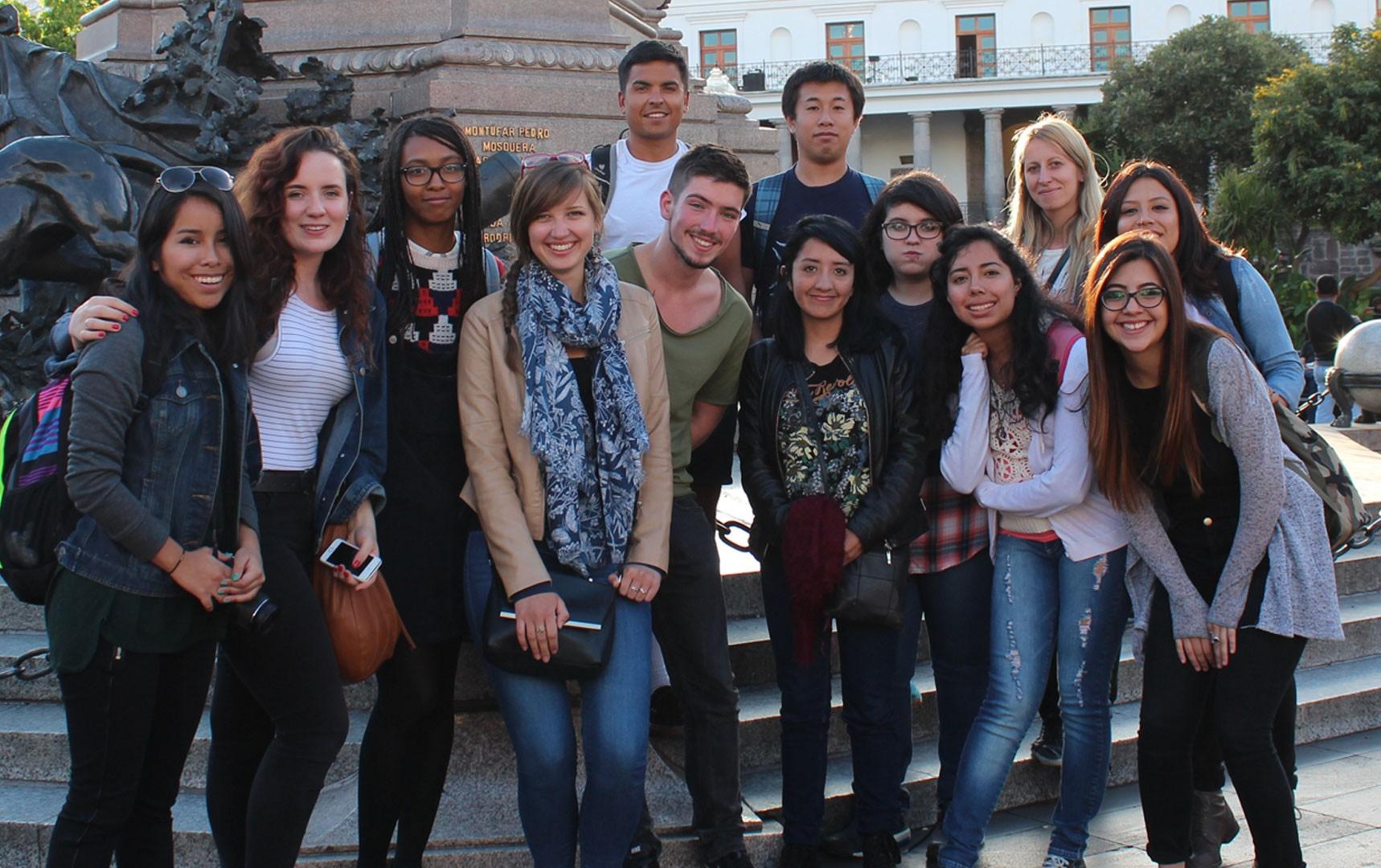
5
GET TO KNOW ECUADOR
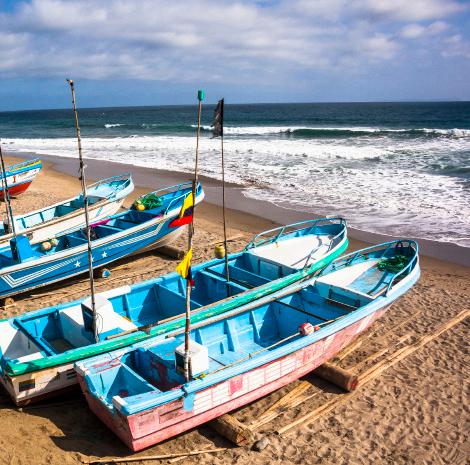
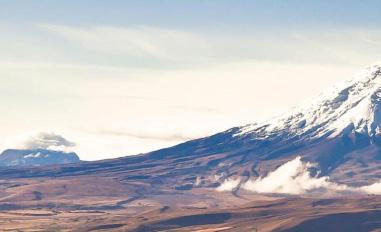
• Ecuador is known as one of the countries with the greatest biodiversity and cultural wealth in the world. It is located in South America and has close to 2000 km of coasts and mangroves, a volcanic region that belongs to the Andes Mountain Range, snowcapped mountains, springs, rivers, and waterfalls in the highlands, and it also has an Amazon region with wet tropical forests and a wide array of parks and ecological reserves. Finally, the insular region or Galapagos is located in the Pacific Ocean, 1,000 kilometers between the peninsula of Santa Elena (Ecuadorian coast) and the island of San Cristobal.
• Ecuador’s time zone is UTC -5. The Galapagos Island’s time zone is UTC-6.
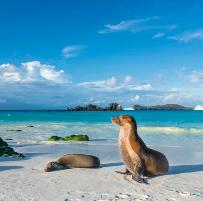
• Ecuador is home to 18 indigenous and Afro-Ecuadorian peoples that are self-declared as nationalities with ancestral roots, legally recognized by the State in accordance with the constitution.
• It is easy and inexpensive to travel within the country using public transportation, which eases travel and exploration.
• The official language of Ecuador is Spanish, which is spoken by 99% of the population, there are an additional thirteen recognized by indigenous languages, including Kichwa and Shuar.
• Ecuador is the first country to include Rights to Nature in their Constitution.
• It is one of the main exporters of flowers, shrimp, and cacao of the world.
6 HANDBOOK FOR INTERNATIONAL STUDENTS
We recommend that you carry bills of 20 USD or less (10, 5, and 1 USD); because many locations do not accept bills of larger amounts.
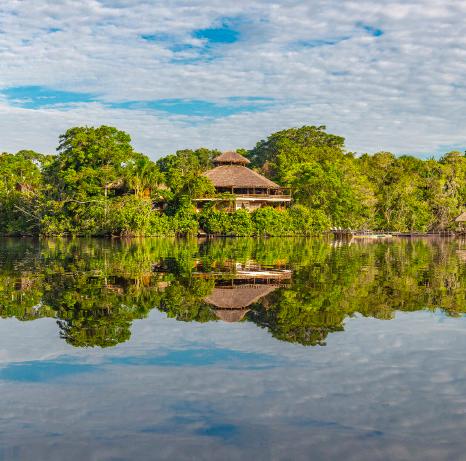

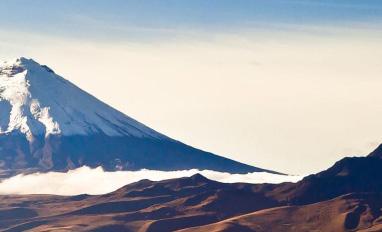
All cities within the country have ATMs. They are primarily located in shopping malls, airports, and main roads. However, for the city of Quito, we recommend that you withdraw money using the ATMs located at the UDLA campus and avoid withdrawing money at night.
For withdrawals you may use debit or credit cards, which are authorized for international use, and which correspond to the most well-known brands: Visa, MasterCard, Cirrus, etc.
7
Currently the currency used in Ecuador is the United
ABOUT QUITO:
Quito is the capital of Ecuador. it is located at the heart of the Andes at 2,854 meters (9,432 ft) above sea level. It is very close to the Equator, and it is known as the city of “eternal spring”. It is a modern city with the best-preserved historic center in Latin America, which was also the first to be declared a World Heritage Site by UNESCO in 1978. This historical center, which is one of the most beautiful in Latin America, hosts various churches and works of art from the colonial period.
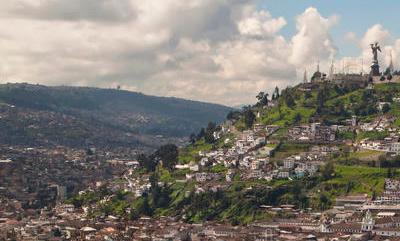
Living in Quito is like living in any big city, you have to take the normal precautions: do not walk alone at night, use safe taxis, mind your valuable belongings, be alert, etc.
In Quito, temperature generally varies from 9 °C (48 °F) to 19 °C (66 °F), it rarely drops below 7 °C (44 °F) or goes higher than 21 °C (69 °F). Normally, the dry season starts in June and ends in September, while the rainy season starts in October and ends in May.
Every year the city of Quito celebrates the festivities commemorating its date of foundation. These festivities begin the last week of November and last until December 6 with cultural and social events, parades with floats, civic-military parades, and popular dances in different neighborhoods of the city.
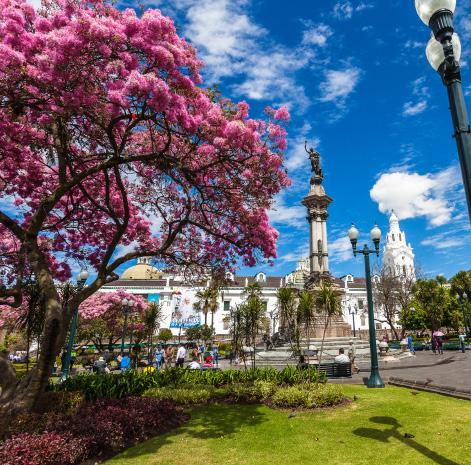
8 HANDBOOK FOR INTERNATIONAL STUDENTS
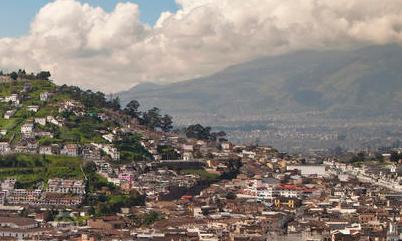
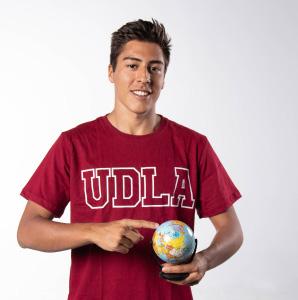
9
PACKING LIST DOCUMENTS
Passport (original and copy– we recommend that you always carry a copy of your passport or a photograph on your cellphone)
Travel itinerary
Medical documents (relating to your international medical insurance and if it is necessary a vaccination certificate) (always carry a photograph with your insurance data on your cellphone)
WHAT PRODUCTS CAN YOU EASILY FIND IN ECUADOR?
Personal care products
Make-up
Female products
Sunblock
Repellent
Lip balm
MEDICAL PRODUCTS
Band aids
Aspirins/ Ibuprofen
Medical prescription items
Para deshidratación
OTHER
Cash (20, 10, 5, and 1 USD bills)
Sunglasses
Camera Books / Dictionaries
Handbags
Laptop computer
Umbrella
Hair drier
Souvenirs for family and friends
AVOID: it is recommended not to purchase or bring jewelry
10 HANDBOOK FOR INTERNATIONAL STUDENTS
Identification document Credit and debit card
CLOTHING
Jeans and/or pants
Short sleeved shirts
Long sleeved shirts
Sweaters or jackets (nights can be slightly cold)
Scarf
ZAPATOS
Zapatos deportivos
Zapatos de cuero
Pajamas
Underwear
Socks
Waterproof
Swimsuit
Sandalias tipo flipflops no suele usarse en Quito
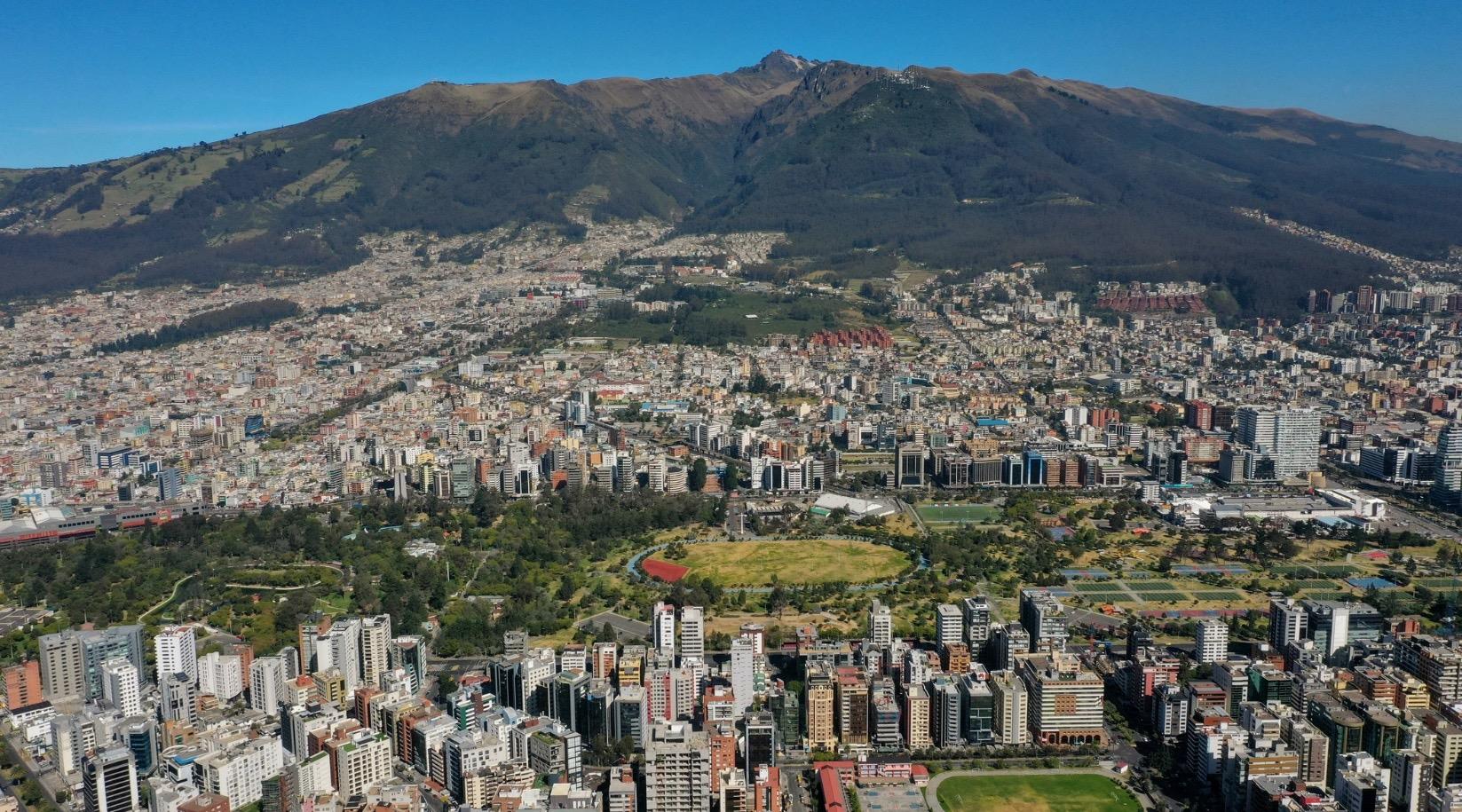
11
SUGGESTED CLOTHING BY REGION HIGHLAND REGION
The altitude in the highlands ranges from 1800 m above sea level to 6310 m above sea level (5,900-20,700 ft) If you like hiking mountains, such as Chimborazo or Cotopaxi volcanoes, consider that the temperature may be lower than in Quito.
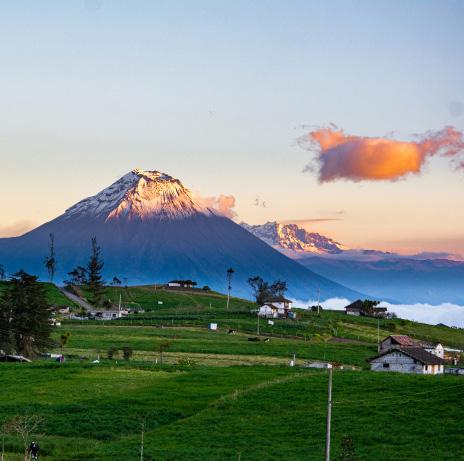
Rainy season is cool and cloudy, while the dry season is comfortable and partially cloudy. During the year, the temperature generally varies from 9 °C (48.2 °F) to 19 °C (66.2°F) and it rarely drops to under 7 °C (44.6°F) or rises to more than 21 °C (69.8°F).
The climate of the Highlands is diverse, including a tropical Andean, temperate, cold, and even glacial, due to the presence of the Andes Mountains and the winds that blow through the valleys and plains.
• If you hike up a mountain, the clothing we recommend you wear is:
• First layer: it should be comfortable, breathable, and quick drying. Shirt (polyester).
• Second layer: is the layer that retains your body’s heat, the «thermal» layer. Sweater and pants with fleece fabric.
• Third layer: is the layer that will protect you from wind and rain. Waterproof and resistant jacket, windbreaker, breathable, so that sweat does not accumulate.
• Shoes: depending on the altitude we recommend winter or snow boots, non-slipping sneakers.
• Hat, gloves, and scarf.
We generally suggest that you wear: Jeans y/o pantalones
• Jeans and/or pants
• Thermal underwear, not necessary
• Waterproof
• Shoes that can get dirty or wet
• Rubber boots
12 HANDBOOK FOR INTERNATIONAL STUDENTS
AMAZON REGION:
The average height in the amazon region is of 450 m (1,476 ft) above sea level while the maximum height is of 800 m (2,624 ft) above sea level.
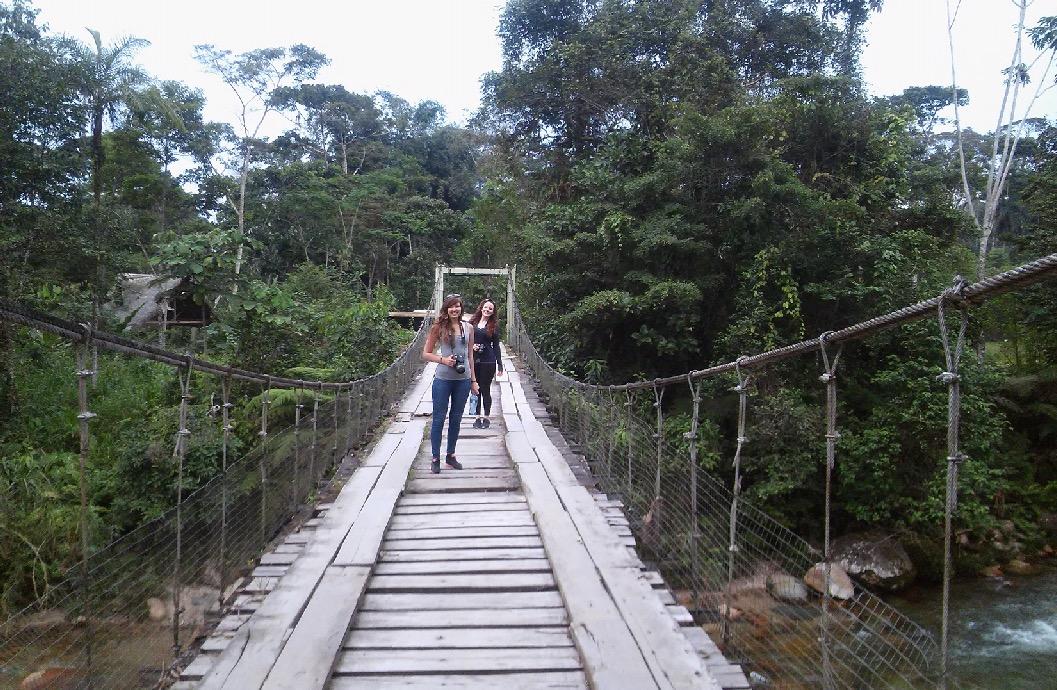
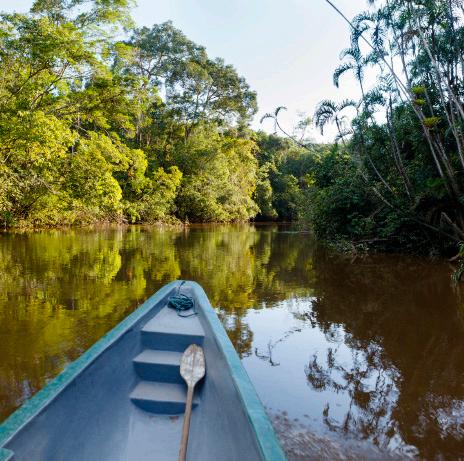
Summers are short, very hot, sweltering, and cloudy; winters are short, hot, muggy, and partly cloudy and it is wet throughout the year. During the year, the temperature generally varies from 22 °C (71.6°F) to 32 °C (89.6°F) and it rarely drops to under 21 °C (69.8°F) or rises to over 35 °C (95°F).
We recommend you wear:
• Jeans and/or light pants
• Short or long-sleeved shirts to avoid mosquito bites.
• Waterproof
• Shoes
• Rubber boots
Important recommendation:
It is very important that you carry sunscreen and repellent because the sun is very strong and there are many insects due to the humid climate.
13
COAST AND INSULAR REGIONS:
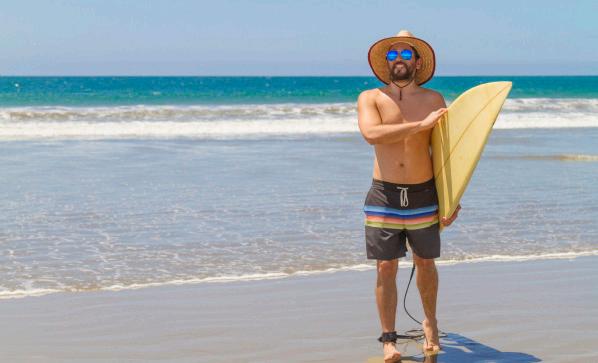
The average height in the coastal region is of 500 m (1,640 ft) above sea level. On the other hand, the insular region -known as the Galapagos- is composed of 13 main islands, 6 medium islands, and 40 small islets that were created after volcanic eruptions.
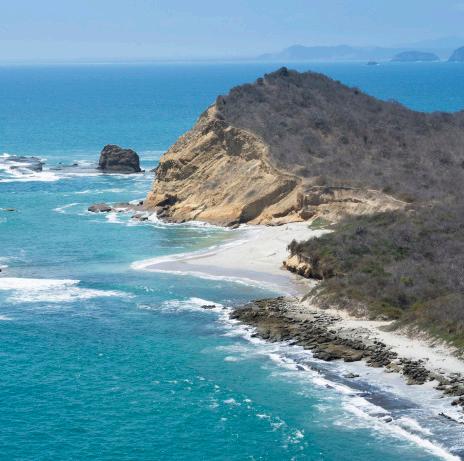
The rainy season is cloudy, the dry season is windy and partially cloudy, and it is warm and sweltering year-round. During the year, the temperature generally varies from 21 °C (69.8°F) to 29 °C (84.2°F) and it rarely drops to under 20 °C (68°F) or rises to more than 30 °C (86°F). We recommend that you wear:
• Blouses or shirts
• Jeans and/or light pants
• Shorts
• Dresses or skirts
• Swimsuits for the beach
• Sunblock
14 HANDBOOK FOR INTERNATIONAL STUDENTS
AIRPORT:
The Mariscal Sucre International Airport is located 18 km (11 mi) east of Quito in the parish of Tababela.
Travel time from Quito to the airport and vice versa can take from 45 to 90 minutes, depending on traffic.
TYPE OF TRANSPORTATION:
Taxi:
• To take a taxi from the airport, you must pay before exiting the terminal at the counter in the international arrivals lobby. The fees are predetermined depending on the destination.
• To go to the airport from Quito, we suggest that you book a taxi in advance. The cost varies between 20 USD to 25 USD approximately.
Uber / Cabify:
Applications are very popular and safe in Ecuador, and they have the advantage of charging you for the distance traveled and not for the time spent in the vehicle (meter). To use these services, you can pay with a credit card or in cash. The fare from Quito-Airport (or vice versa) is between 18 USD to 30 USD approximately, depending on the time of day.
Aeroservicios Shuttle:
They offer a transportation service between Quito and Mariscal Sucre International Airport (Tababela) - Quito 24 hours per day, 365 days per week without any stops. The buses have a capacity for 51 passengers, and you can purchase the ticket in the counter at the counter in the international arrivals lobby. Meanwhile, in Quito the bus departs from the Bicentenario Park (former Quito airport). The cost for a one-way ticket is 8.50 USD.
Taxi organized by UDLA International Programs
We can help you with your transfer when you arrive in Ecuador, provided that you carry out the corresponding notification at least 1 week in advance. For this, you must send the following information to our email programasinternacionales@udla.edu.ec:
ARRIVAL INFORMATION
• Name
• University
• Arrival date
• Time of arrival
• Flight number
• Airline
15
ACCOMMODATION
There are several options for accommodation while you are doing your exchange or short course program at UDLA; we can help you arrange this service with an external provider. St. Gallen Haus is an experienced provider in providing short- and longterm accommodation for international students.
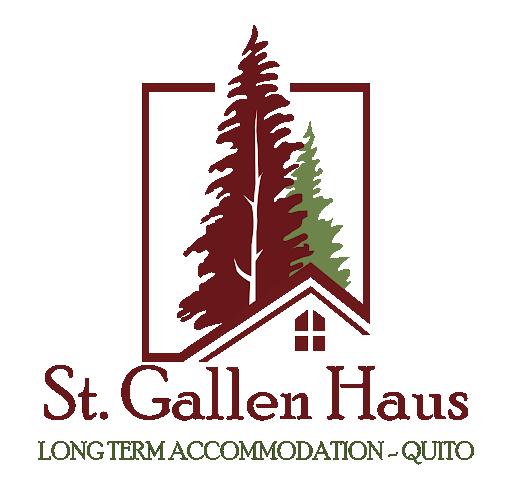
The accommodation available through our provider includes rooms (individual and shared), apartments, and host families. You can choose your preferred accommodation.
Living with a host family has an approximate cost of 24 USD per day, this includes breakfast and dinner, internet service, laundry services, and basic housekeeping once per week. Other options include shared apartments or rooms, whose cost varies between 16 USD and 60 USD per day.
Living with an Ecuadorian host family is part of the cultural and language immersion experience for our students. Host families are chosen through a selection process handled by St. Gallen Haus, and they are instructed on their responsibilities to guarantee student’s safety and wellbeing. St. Gallen Haus seeks for the student to have a safe, comfortable, and pleasant stay.
For more information visit: https://www.stgallenhaus.com/en/
There is also the option to find accommodation independently. At the International Program Office, we can support you with your search. We have a tenant data base with different accommodation choices that include shared rooms and apartments.
If, for any reason, you have not found accommodation, we suggest that you reserve one through Airbnb or live with a host family for a couple of weeks until you find suitable accommodation.
BUDGET
Estimated costs for a long stay:
• Accommodation without utilities: 300 USD-400 USD per month in a shared apartment or a room in a family home.
• Utilities (Gas, Electric, Water, Internet): 100 USD per month approximately
• Cellphone and data plan: 10 to 20 USD per month.
• Food: 300 USD per month.
• Host family: 24 USD per day, includes breakfast, dinner, internet, laundry, and basic housekeeping.
• Class supplies: 200 USD per semester.
Suggestions: We recommend having a monthly budget of 600 USD so you can cover all the costs necessary and not have any economic problems.
16 HANDBOOK FOR INTERNATIONAL STUDENTS
Prices of some commonly consumed products:
• Bottled water 500 ml: 0.50 USD.
• National beer at a store: 1.50 USD.
• Imported beer at a store: 3.50 USD.
• Public Urban Transportation: 0.25 USD per route.
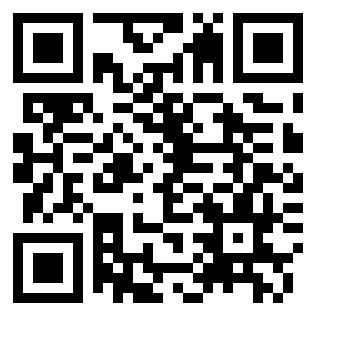
• Taxi trips: minimum tariff of 1.50 USD during the day and 1.75 USD at night (if you are going to use a yellow taxicab, we always recommend that you request your driver to turn the meter on)
• Clothes: They can be found in shopping malls, boutiques, or independent stores. Pricing depends on the brand and place of purchase, generally imported goods are expensive.
• Basic lunch (appetizer, main course, juice, and dessert): 3 – 4 USD per person
• Dinner at a restaurant: 20 – 30 USD per person
STUDENT VISAS SEMESTER EXCHANGE:
Students who come for one or two exchange semesters must request a temporary resident visa: Student. This process is done through the Virtual Consulate which is a directed web portal for foreign students to request visas that allow them to legitimately stay within Ecuador.
The validity of this visa is for one calendar year from the date of issuance or as provided by the Ecuadorian authorities, based on the start and end dates of the academic period to be studied at UDLA.
Information about the issuing process in this visa category can be found at the procedure web portal of the Republic of Ecuador:
https://bit.ly/3llAxoF
17
Costs:
Visa application: 50 USD Visa granting: 400 USD
Check our quick guide to request this type of visa: https://bit.ly/3JVvHYI
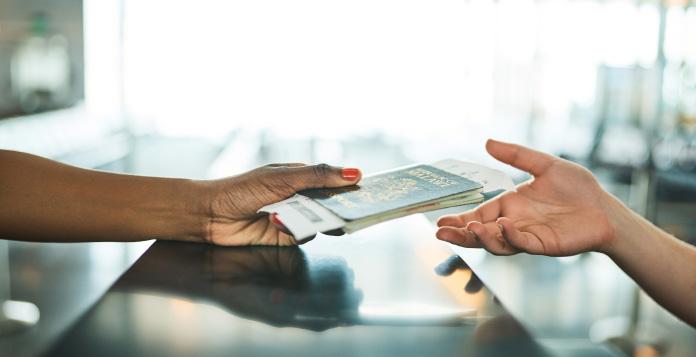
SHORT COURSES / RESEARCH INTERNSHIPS:
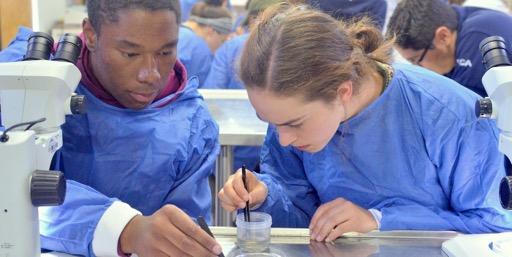
Depending on their nationality, students that participate in a short course at UDLA may enter Ecuador as tourists. This migration category allows people to remain in Ecuador for a period of 90 days from the time of entry.
If the person wishes to extend this period, they must request an extension at the Migration Department of the Ministry of Government located in the city of Quito. The extension of the remaining period as a tourist grants the applicant 90 additional days which adds up to a total of 180 days.
For more information visit:
https://bit.ly/400edQn
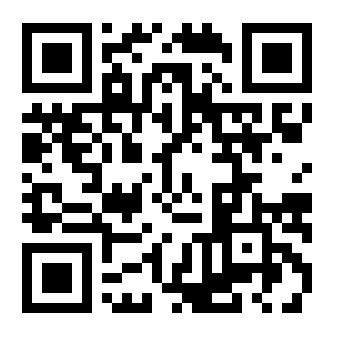
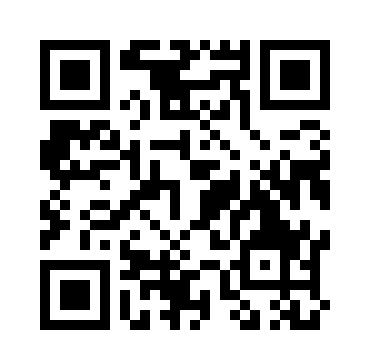
18 HANDBOOK FOR INTERNATIONAL STUDENTS
CAN and MERCOSUR member countries: Citizens from CAN and Mercosur member countries do not need a passport or visa to travel as tourists, all that is needed is a valid identification with a photograph.
Temporary student visitor visa: This visa must be requested by foreign people of the Special Regime countries that visit Ecuador for a maximum period of 90 days.
Special Regime Countries: Afghanistan, Bangladesh, Eritrea, Ethiopia, Kenya, Nepal, Nigeria, Pakistan, Somalia, Senegal, Cuba, Republic of Korea, Angola, Cameroon, Gambia, Ghana, Guinea, India, Irak, Libya, Democratic Republic of Congo, Syria, Sri Lanka, and Venezuela.
Costs:
Visa application: 50 USD Granting of visa: 150 USD For more information visit: https://bit.ly/3ZYNF1O
Visas issued by the Ministry of Foreign Relations and Human Mobility of the Republic of Ecuador are electronic; this means that they can be printed in color and do not require to be stamped on the applicant’s passport.
The Government of the Republic of Ecuador offers free legal advice on immigration matters for
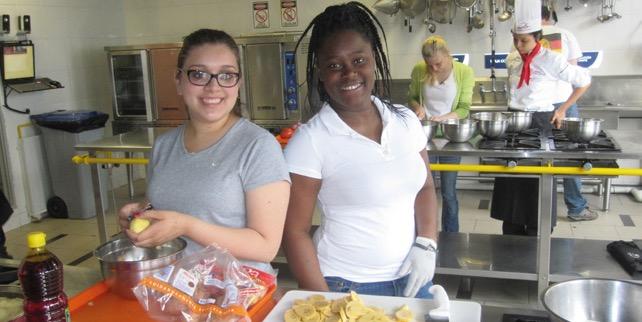
national and foreign citizens. If you require advice during your stay in Ecuador, review the information displayed on the following website: https://bit.ly/401arGt
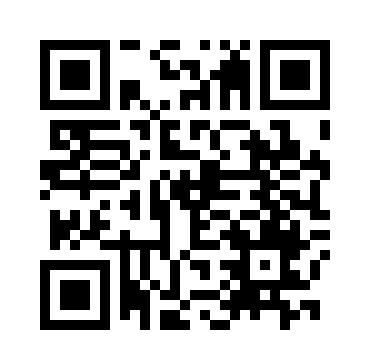
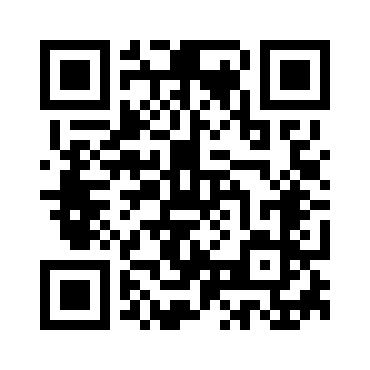
19
VACCINES
The Center for Disease Control and Prevention (CDC) recommends being up to date with routine immunizations, including MMRV (measles, mumps, rubella, and varicella), DTaP (diphtheria, tetanus, and pertussis), polio, and the annual influenza vaccine.
Most travelers must have their hepatitis A and typhoid fever vaccines. The yellow fever vaccine is required for tourists who come from countries that have risk to contract the disease and it is recommended if you travel deep into the Amazon rain forest. Malaria is not found in Quito, but it could be a risk in regions that are closer to sea-level such as the Amazon and the Coast.
Make sure you bring your vaccination yellow card to Ecuador.
COVID-19 VACCINATION
Every participant of the international programs organized by UDLA must have a full vaccination scheme against COVID-19. Review the information regarding the vaccines acknowledged by the Ministry of Public Health and fill out the traveler health declaration requested upon your arrival to Ecuador. For more information visit: https://www.salud.gob.ec/
INTERNATIONAL MEDICAL INSURANCE COVERAGE
Students who participate in international programs organized by UDLA must have international medical insurance contracted from their country of origin against all risks, including repatriation. Please send your insurance policy information to the following e-mail address: programasinternacionales@udla.edu.ec It must include the following information:
• Name of the insurance company
• Policy number
• Coverage start and end date
• Maximum coverage amount
Please note that you should ask your home country for emergency contact numbers and/or request the contact information of the local health provider providing services in Ecuador.
EXCLUSIVE MEDICAL COVERAGE FOR INTERNATIONAL STUDENTS
As of 2020, UDLA offers a free insurance policy to all its international students during the period in which they are participating in the international programs offered (semester exchange, research internships, short courses). This insurance policy will be given to you upon your arrival to Ecuador and may be used in cases of medical emergency or hospitalization. Compañía Aseguradora: ASSIST CARD
*Does not apply for students that hold the Ecuadorian nationality
20 HANDBOOK FOR INTERNATIONAL STUDENTS
The coverage data are as follows:
Insurance Company: ASSIST CARD
Product:
Policy
21
AC35
Detalles de la póliza: Maximum Global Amount USD 35,000 Medical Assistance in case of an Accident * Up to USD 35,000 Medical Assistance in case of non-pre-existing disease * First Medical Attention in case of Pre-existing Disease * Emergency Dentistry (Max. € 300 / USD 300 per tooth) Outpatient medication Up to USD 35,000 Up to USD 300 Up to USD 500 Up to USD 800 Medication in case of hospitalization Sports practice Pregnancy Prosthetics and orthotics Included Up to USD 10.000 Up to USD 10.000 Up to USD 1.300 Health transfer Included Repatriations (health or funerary) Included Return of the repatriated holder's companion Included Transfer of a family member Accommodation of a family member Included USD 100 Accommodation of a family member USD 400 Hotel expenses for forced rest after a hospitalization USD 180 Hotel expenses for forced rest after a hospitalization Accompaniment to minors or the elderly USD 900 Included Reimbursement for delayed or canceled travel expenses Reimbursement of expenses due to loss of connection Early return due to a serious loss at home Up to USD 200 Up to USD 200 Included Legal assistance due to a responsibility in an accident Fund advance for bail Assistance in case of document theft or loss, etc. Location of luggage Up to USD 8,000 Up to USD 8.000 Included Included Telemed - Online medical appointments Included Insurances Accidental death as a passenger in Public Transportation Total and permanent incapacity in case of an accident Compensation for loss of baggage Supplementary Compensation for delayed delivery of baggage USD 50,000
details:
USD 40,000
Up to USD 1.200
Up to USD 200
*Includes: Medical appointments, Specialist appointments, Contact with consulting pediatrician, births, and pregnancy status until the 26th week, Complementary medical examination, Physical recovery therapy in case of injury, Medication, Emergency dentistry, Hospitalizations, Surgery, Intensive therapy, and coronary unit.
IMPORTANT:
• Deductible does not apply
• Warranties do not apply
• Expenses not covered by the policy must be paid at the private health center disposable materials, hydration, etc.)
• You must contact Assist Card’s call center within 24 hours of admission to arrange coverage (preferably before going to a particular private health care facility).
ACCIDENT INSURANCE FOR UDLA STUDENTS
Accident insurance is a benefit offered by UDLA for all its student body and it is handled through our insurance broker Raúl Coka Barriga. This coverage for international students is complementary to the Assist Card policy (exclusive for international students). The coverage data is as follows:Compañía Aseguradora: AIG METROPOLITANA
Insurance Company: AIG METROPOLITANA

Product: UDLA – RAÚL COKA BARRIGA
IMPORTANT:
• There is a 60 USD deductible which must be paid at the private health center where you were admitted.
• The private health center may request for a reimbursable warranty for the service provided.
• Expenses not covered by the policy must be paid at the private health center (disposable materials, hydration, etc.)
22 HANDBOOK FOR INTERNATIONAL STUDENTS
Accidental Death USD 5.000 Medical Expenses due to an Accident Up to USD 2.000 Dental expenses due to an accident Up to USD 900 Accidental Dismemberment and Total and Permanent Disability due to Accident USD 5.000 Daily hospitalization rent due to an accident USD 50 (Max. 30 days)
Policy details:
• It can only be used in the private health center specified by Raúl Coka Barriga’s call center, which must be contacted at the time of the accident.
• Call center Raúl Coka Barriga. 09 99 911 911
PROCEDURE IN CASE OF EMERGENCY OR ACCIDENT
• Immediately call the Assist Card call center 1800 000 188, 24 hours a day, the person who answers will register all the information about the emergency.
• Immediately transport the injured policyholder to the nearest clinic/hospital.
• Provide your identification or passport (preferably the original) at the clinic/ hospital which is part of the policy to receive medical care and hospital credit.
• The clinic/hospital which is part of the policy will communicate with the insurance provider to request a hospital credit authorization due to an accident.
• In case of an emergency, the clinic/hospital which is part of the policy will directly provide the form to the student, which must be filled and signed by the policyholder.
• The authorized amount for the care shall be determined in the Assist Card policy or in the personal accident policy provided by AIG Metropolitana depending on the insurance used.
The International Programs team will be available 24 hours to provide help in an emergency. Upon your arrival to UDLA you will receive an emergency contact card for each case.
MEDICAL APPOINTMENTS:
UDLA Medical Offices
If you feel any physical discomfort while at UDLA, you can visit our medical offices located in every campus and request medical assistance.
Assist Card Telemedicine:
It is a remote medical assistance service, which through a digital platform allows you to have a video call with a clinician/pediatrician from anywhere at any time. The professional will answer your call like a traditional medical appointment and provide you a diagnosis to give you the best solution.
Download Assist Card’s Telemed App available for Android and IOS.
Appointments with private doctors:
If you wish to request a consultation with a private doctor, we recommend that you first be seen by one of the doctors at the UDLA offices, who will be able to make an initial diagnosis of your condition.
Raúl Coka Barriga Benefits Club:
Our insurance Broker, Raúl Coka Barriga, offers you a set of benefits through their mobile app, such as discounts for: medical appointments, food, stationary, and much more. The application is available for Android and IOS.
23
SECURITY
Living in Quito is like living in any big city, you have to take the normal precautions: do not walk alone at night, use safe taxis, mind your valuable belongings, be alert, etc.
General Recommendations:

• Common sense.
• Be aware of your surroundings (periodically look behind you).
• Story your telephone, computer, camera, and other valuables. Leave your valuables at home.
• Be careful and keep your eyes on your purse and/or backpack.
• Be careful at ATMs: every UDLA campus has ATMs available.
• Share your plans
• Daily: to classmates, host families, friends.
• Visits outside Quito: to International Programs


• Communicate with your professors (problems, absences, travel, questions)
• Always exercise caution
• ENJOY, LEARN, EXPLORE
IN CASE OF EARTHQUAKES:
If you are outside:
• Stay away from buildings, cables, and other structures. If you are inside:
• If you are near a column or a connecting triangle between walls, stand there.
• Do not stand under door frames that are not reinforced.
24 HANDBOOK FOR INTERNATIONAL STUDENTS
NATIONAL EMERGENCY NUMBER: 911
GASTRONOMY
Ecuadorian cuisine is a fusion of the diverse food from the country’s provinces and regions. It also uses many products from other countries, which have been included in agricultural production.
Ecuadorian cuisine has a predominance of a variety of ingredients. Take into consideration that Ecuador has access to three different culinary resources: fish and seafood from the Pacific Ocean; products from the Andean Region; and finally, a wide array of roots, fruits, root crops, and animals inherent to the Amazon. Due to its large variety of food resources, every region in Ecuador has their own typical dishes.
There are dishes that are popular nationwide, from the Coast we have: ceviche, encebollado, bolón de verde; in the Highlands: locro de papa, goat stew, fritada, among others.
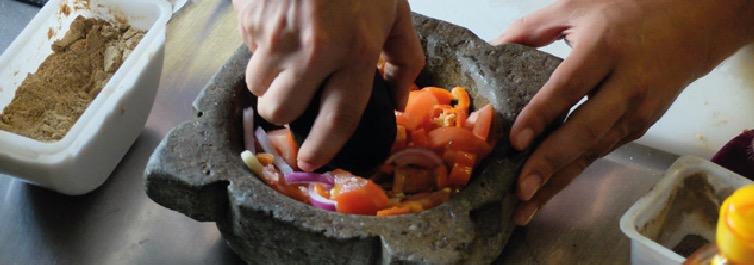
Gastronomy found in Quito
Quito is not only distinguished by its picturesque landscapes, but also for its varied gastronomy in restaurants, dining rooms, and even hole-in-the wall restaurants to find various dishes that can be enjoyed by domestic and foreign visitors who visit the city.
Below we have a suggestion of traditional dishes from the Ecuadorian capital:
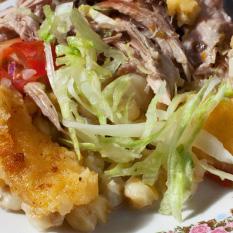

Hornado: Is one of the most representative dishes of the Ecuadorian gastronomy. It is prepared using pork in a wood-fired oven. It is served with mashed potato pancakes and the famous “agrio” (a pickled onion and tomato sauce that is sweet and salty).
Fritada: Unlike hornado, the pork is fried. It is generally served with mashed potato pancakes or boiled potatoes. Some places add hominy, cooked maize, onions, picked onions and tomato, and plantain.
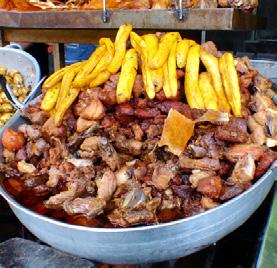
25
Locro de papa: Traditional dish from the Highlands, it is a creamy potato soup served with cheese and avocado.
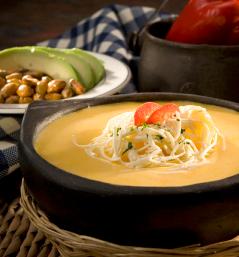
Ecuadorian churrasco: Although churrasco is a popular dish throughout Latin America, each country has its own version. In Ecuador, the dish is made using beef prepared on a grill or griddle. It is served with French fries, a fried egg, and salad.
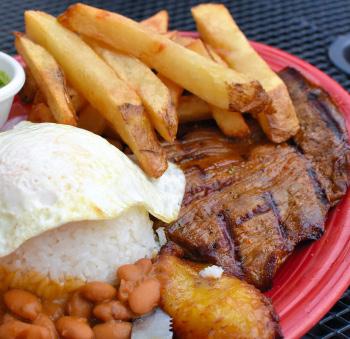
Bolón de verde: It is an unmissable staple of Coastal breakfasts. The dish consists of mashed plantain that is formed into a ball and filled with cheese, pork crackling, or fried beef.
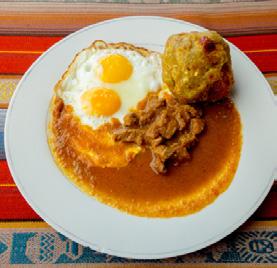
You can download applications to your cellphone that deliver food to your home for an added charge, such as Uber Eats, Pedidos Ya or Rappi. It is a safe and easy way of ordering what you want to eat. These applications include traditional and international cuisines.
TOURIST SITES IN QUITO:
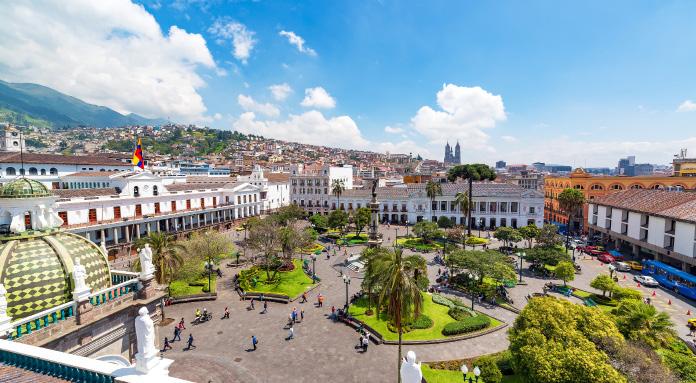
Historical Center:
Is considered a Cultural Heritage to Humanity, it offers an impressive architecture with squares made of volcanic material, large republican buildings, monasteries, convents, churches that feature Baroque and Gothic aesthetics, it is home to museums packed with the depiction of its history. You can visit the Basílica del Voto Nacional, Iglesia de la Compañía de Jesús de Quito, the La Merced Church and Plaza, among others. Additionally, you can visit Carondelet Palace, which is the premises of the National Government and the official residency of the President of the Republic of Ecuador.
Middle of the World:
The Middle of the World City is a good option to visit with friends or family. It is located 13.5 km (8.5 mi) away from Quito and it is a tourist, cultural, and scientific site. It is geographically oriented to the four cardinal points and is located on the
26 HANDBOOK FOR INTERNATIONAL STUDENTS
Equatorial Line of latitude zero degrees zero minutes and zero seconds, (0°0’0’’).
Its main attraction is the monument, which is in the middle of the site and hosts an Ethnographic Museum, which is based on the indigenous ethnography of Ecuador.
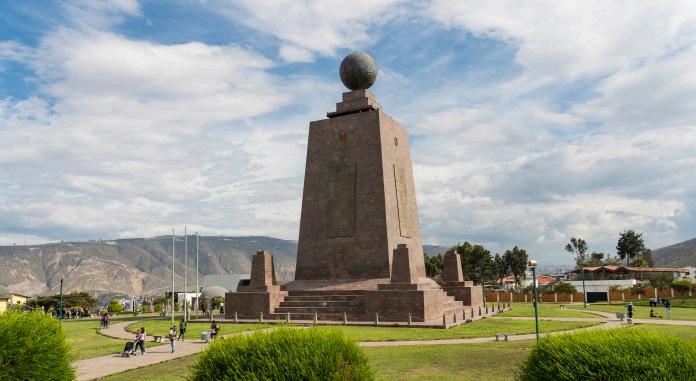
Teleférico:
The Teleférico Cable Cars is located 4050 meters above sea level (13,287 ft). This location has a panoramic view of the city of Quito. In days when the skies are completely clear you can see snowcapped mountains such as Cayambe, Cotopaxi, and Chimborazo.
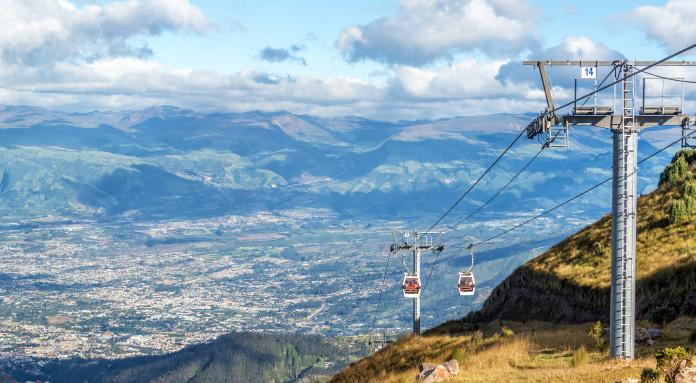
This side also has an amusement park “Vulqano Park” with attractions and games for children and adults. The ride begins at 2950 meters above sea level (9,678 ft), reaching approximately 4000 meters above sea level at the end (13,123 ft), which allows you to observe the change in vegetation along the 2.5 km (1.5 mi) trail in the Andes.
Panecillo:
Is a monument located in the center of Quito, it has a lookout point that lets you see the whole city from the North, to South, and the Historical Center. It costs one dollar (1 USD) to access. You can also enjoy typical Quito appetizers such as morocho (a white corn beverage) or empanadas. For more information visit: https://bit.ly/3FyvLuE
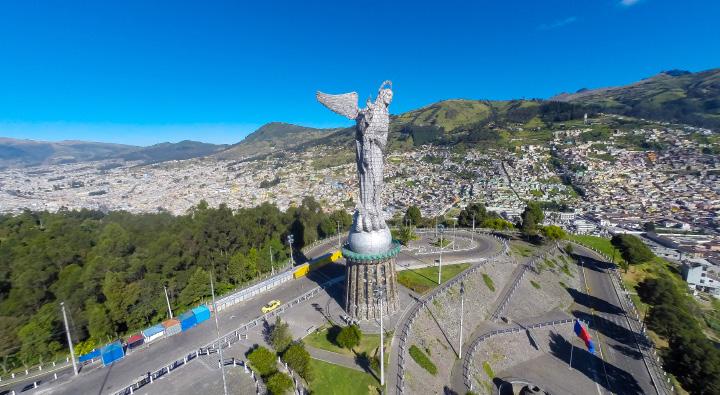
La Ronda:
Is a traditional street in Quito, which is one of the oldest in the city. Here you can enjoy the cuisine, crafts, and nightlife. The street is the birthplace of pioneering local musicians, painters, and poets from the 1930s. It is recommended that you do not take valuables and do not stay until very late.
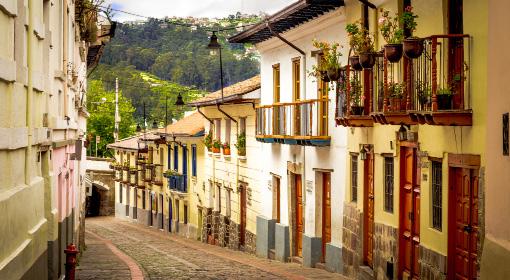
27
La Mariscal (Plaza Foch):
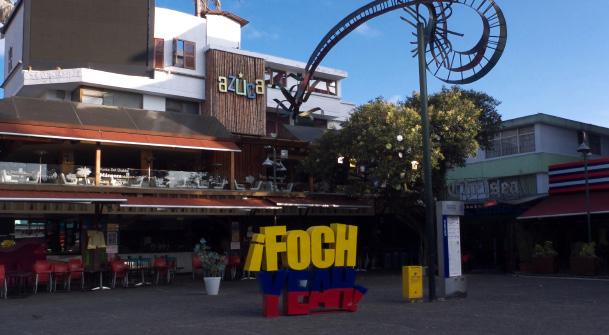
It is an area that is filled with cafeterias, bars, restaurants, and night clubs where the nightlife of the city happens. It is located in the Central-Northern area of Quito. We recommend being attentive to your safety because this area is considered a “red zone”.
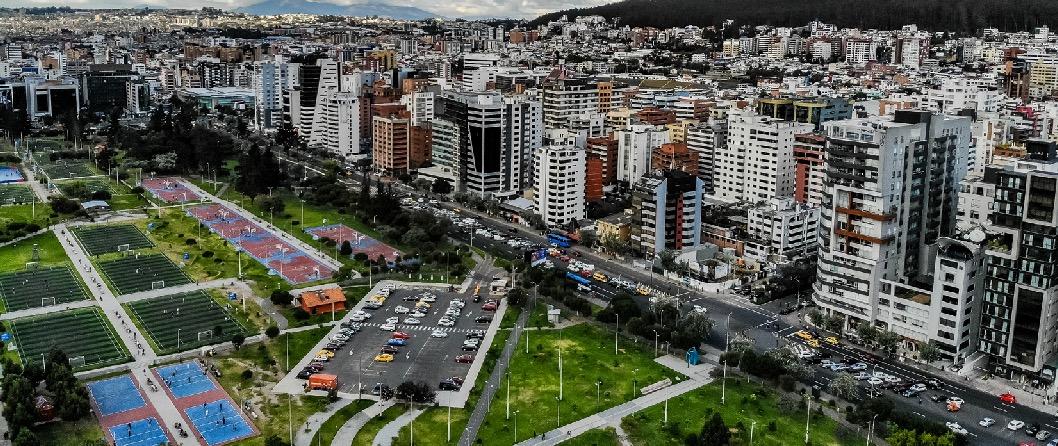
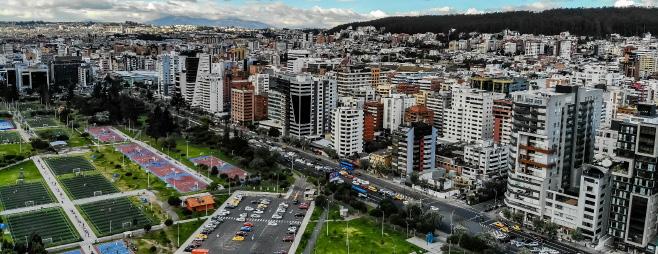
Is one of the first neighborhoods that developed outside of the center of Quito. It is well known for the cultural diversity that is showcased in its theater or in the Ocho y Medio movie theater where mostly independent movies are projected. Additionally, it has many restaurants with local and international cuisine.
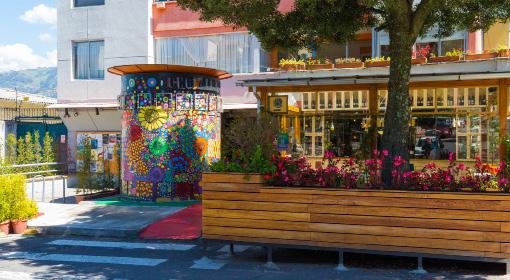
The building is a part of the Fundación Guayasamín cultural complex, which is made up by the Workshop-house where the artist Oswaldo Guayasamín lived in until his death, along with one of the archaeological sites in Quito that has the greatest number of visitors and where you can find 13 pre-Incan tombs. Additionally, it has an art gallery with paintings made by the artist known as Guayasamín.
GREEN AREAS - PARKS:
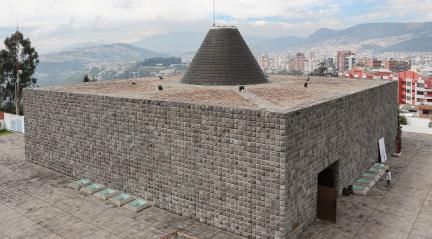
28 HANDBOOK FOR INTERNATIONAL STUDENTS
La Floresta:
Capilla del Hombre:
La Carolina Park:
This green area inside the city is located at the eastern end of the park, next to Shyris Avenue and close to the business sector of República de El Salvador Avenue. It is made up of 42 playing areas corresponding to different disciplines:15 canchas de fútbol
• 15 soccer fields
• 15 volleyball fields
• 9 basketball courts
• 2 pelota nacional courts
• 1 court for the visually impaired
Additionally, it has an area of clay tennis courts, a BMX track which is used for professional practices, a marathon track with synthetic pavement used for athletic practice, an artificial lake, wood piers, and a fleet of pedal boats. It also has a Skate Park, which is a big platform built to practice sports such as roller-skating, skateboarding, and cycling.
Bicentenario Park:
It is a green public space in the city of Quito. Anyone can have access to use its recreational facilities. It is located in the Northern area of the city, and it is where the old airport of the city used to be located.El parque posee algunas esculturas como: Las Tahitianas, Cruz del papa Francisco, Helicóptero de DaVinci, Máquina voladora de DaVinci
It has some sculptures such as: The Tahitians, Pope Francis Cross, DaVinci Helicopter, DaVinci Flying Machine.
The Bicentenario park also hosts the Amazonas Boulevard which connects the El Labrador Station with the Bicentenario Convention Center. It is a boulevard that extends almost 1 km along the western end of the park’s southern headwaters, bordering Amazonas Avenue, from which it gets its name. It holds 15000 m2 of green areas, cross fit courses, streetball, cycling paths, playgrounds, and ornamental fountains.
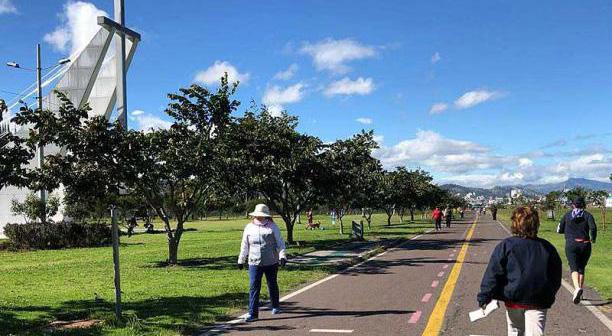
Additionally, the park has 1163 parking spots that are divided into three parking lots which are known as Lots A, B, and C.
Lot A - 336 spots
Lot B - 420 spots
Lot C - 407 spots
29
Guangüiltagua Metropolitan Park:
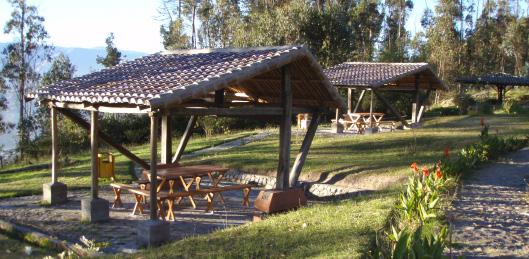
It is one of the largest parks in Quito. Here you can carry out many activities such as exploring, camping, cycling, walking, visiting the look-out sites, and hiking paths. It is composed of four areas: the parking lot and playgrounds; the eucalyptus forest; a treeless area with large-scale sculptural installations; and the picnic areas, home to the Scarlet-rumped Woodpecker and other birds.
Camping rules
Prohibited
• Consuming drugs, alcohol, cigarettes, or narcotics.
• Lighting fireworks (flares and flammable substances).
• Firearms and knives.
• Disrespecting the camping and hiking areas.
• Informal selling is not allowed.
• Avoid wasting water
• What is allowed
• Camping
• Keep the camping area clean.
• Avoid wasting water.
• Carry a flashlight.
• Food.
• Security when camping.
There are 20 park rangers, 15 national police, 10 metropolitan police, 5 firemen, and 5 Quito Tourism operators.5 bomberos y 5 operadores de Quito
30 HANDBOOK FOR INTERNATIONAL STUDENTS
Itchimbia Park:
This park is located at an altitude of 2,910 meters above sea level (9,547 ft) and it is made up of 54 hectares. In the park you can carry out many activities. There are playgrounds for children, sports courts, and sports tracks. From the park you will be able to observe some of the best places in Quito such as the Panecillo, the churches and the old houses. If the day is not cloudy, you can see the crowns of the Rucu Pichincha and Cotopaxi volcanoes. Business hours from 5:00 am to 6:00 pm.
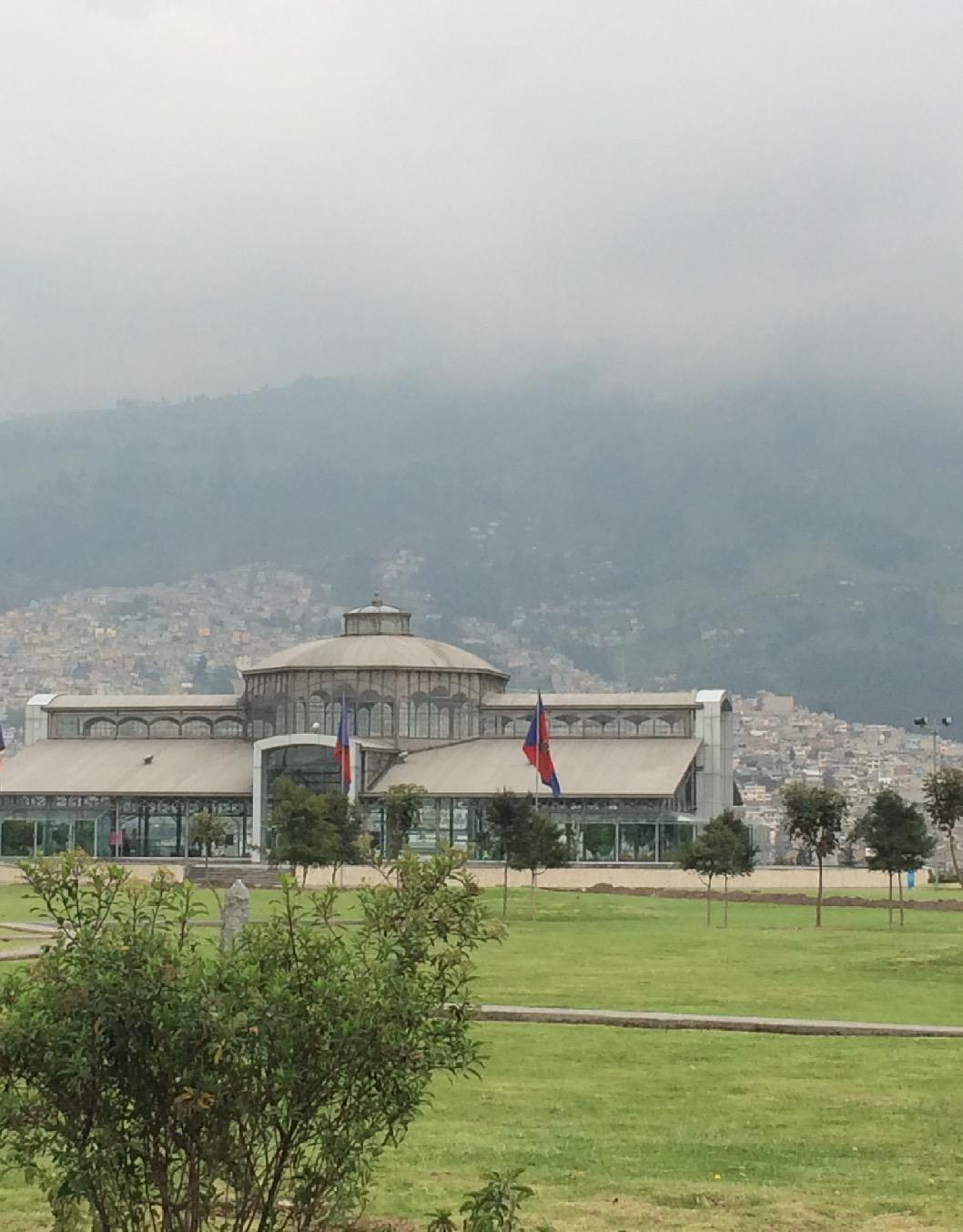
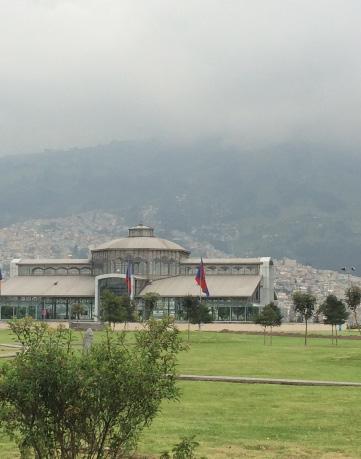
31
INFORMATION OF INTEREST ABOUT QUITO:
TRANSPORTATION:
Public transportation:
There are three transportation routes that travel along the city from North to South, as well as public transportation routes (blue buses) for the transversal axes of the city (East
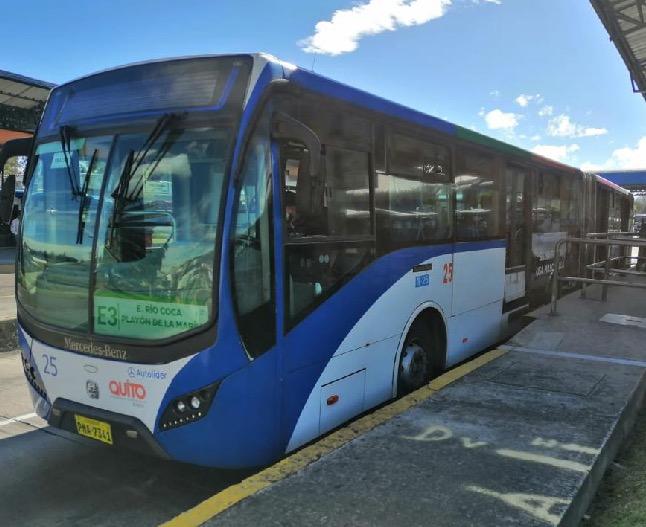
– West). The cost of public transportation per trip is 0.25 USD. The transportation routes with exclusive lanes (North - South) are the following:
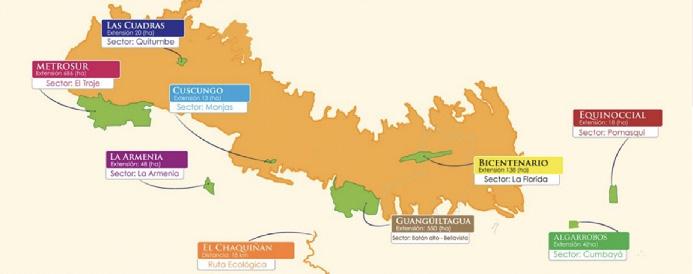
• Ecovía: Ave. 6 de diciembre;
• Trolebús: Ave. 10 de agosto; and,
• Metrovía: Ave. América
Stations close to the UDLA campuses:
UDLAPark Campus:
Rio Coca Station: Ecovía
Cross-parish transportation: green buses that travel to the valleys of Cumbayá and Tumbaco
Granados Campus:
Río Coca and Los Sauces
Stations: Ecovía
Campus Colón:
Baca Ortiz Station: Ecovía
32 HANDBOOK FOR INTERNATIONAL STUDENTS
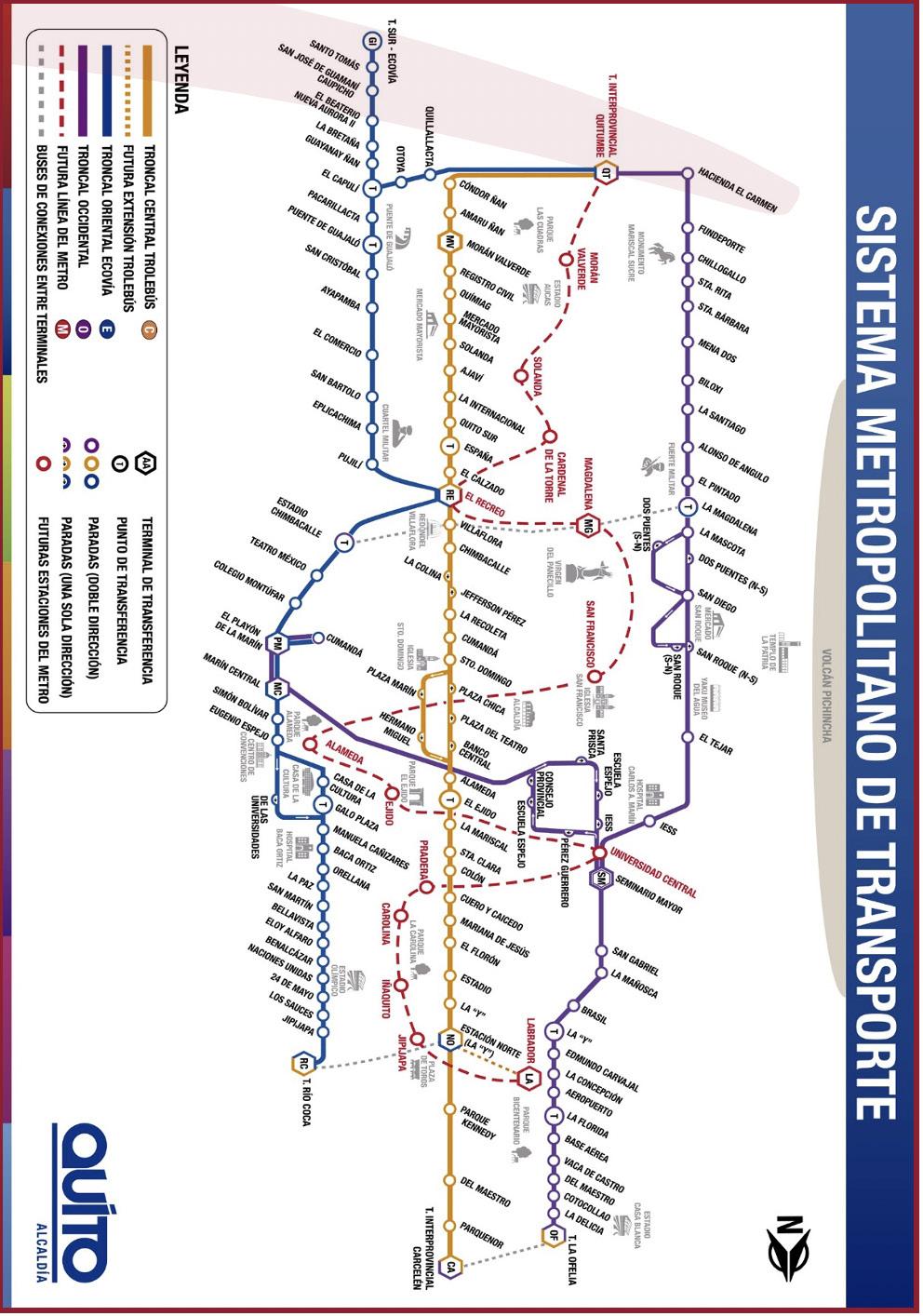
33
BiciQuito:
Public Bicycle system BiciQuito works upon registration, which means you need to register to access the service and its activation is free of charge. You can be a user of this service any day of the year and travel from one station to another.
For more information access: http://www.quitoinforma.gob.ec/tag/ biciquito/

Sunday bicycle route:
Every Sunday between 8:00 am to 2:00 pm, you can ride your bicycle, rollerblades, skateboard, or jog in the streets and avenues of the city, which are pedestrianized specifically for this purpose.
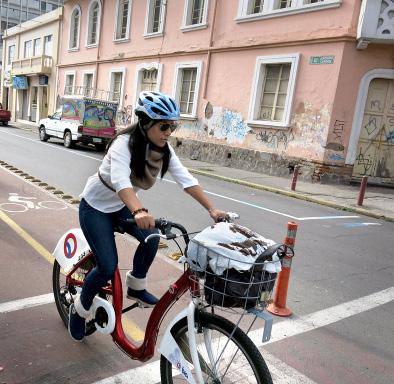
Taxis:
Official taxis in Quito are yellow, and you must review that they have the following labels on the taxi to make sure that it is a safe taxi:
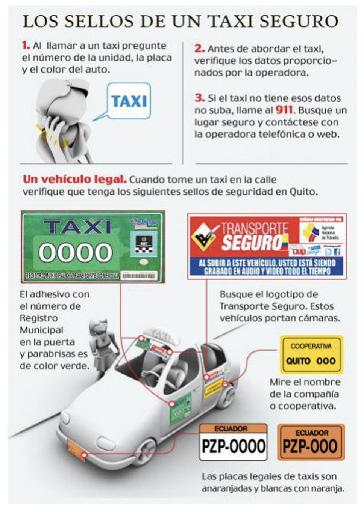
34 HANDBOOK FOR INTERNATIONAL STUDENTS
Remember to request your driver to start the meter. By law, they must use the meter during the day and night. The meter starts at 0.50 USD and the minimum trip is of 1.50 USD during the day and 1.75 USD at night.
Uber:
You may download these application using the information on your credit or debit card. In Uber’s case you may also pay in cash. This service is safer and, oftentimes, may be cheaper than a normal taxi.
Important: In Quito, these applications are not yet legally authorized to provide transportation services; as such, the drivers generally request the passengers to travel in the front seat to avoid fines.
LAND TRANSPORTATION TERMINALS:
Quito has two land terminals for interprovincial transportation, each located at either end of the city.
Quitumbe Interprovincial Terminal: is the main bus station for interprovincial transportations in the city of Quito. It is located in the Southern part of the city, you can arrive using the Ecovía, Metrovía, and Trolebus.
At this terminal you may board any terrestrial transportation service to travel to other cities in the country. It is the most recommended terminal to travel to the south of the country.
Carcelén Interprovincial Terminal: located in the Northern part of the city is where you can board any transportation service to travel to another city. It is the most recommended terminal to travel to the north of the country.
TRANSPORTATION BETWEEN
UDLA CAMPUSES:
The Move on UDLA campaign provides the following options:
1.UDLA Cross-campus Bus
They are free of charge and operate every 15-20 minutes, following this route:Campus Granados

• Granados Campus
• Veterinary Clinic
• UDLAPark Campus
• Veterinary Clinic
• Granados Campus
To know the real-time location of the cross-campus buses, use the UDLA+ app. Available for Android and IOS.
35
2. AseUDLA Minibuses
• The cost per student for this service is of 0.25 USD. They operate every 10 minutes.
• Leaves from the Granados Campus to the UDLAPark Campus and vice-versa.
3. Shared taxis UDLAPark / Granados Cost 1.25 USD per trip.
4. 4. Shared taxi to and from Colón Campus Cost 1.00 USD per person or 3.00 USD to / from Granados or UDLAPark campus.
SUPERMARKETS AND MUNICIPAL MARKETS:
There are various supermarket chains where you can buy all types of food products, cleaning products, among others. The supermarkets are: Supermaxi, Megamaxi, AKI, Mi Comisariato, Santa María, El Coral, among others. The supermarkets located closest to UDLA are AKI, located in the “Granados Plaza” shopping mall which is located two blocks from the Granados Campus; Supermaxi, located at Eloy Alfraro Ave. and Granados Ave.
PHARMACIES:
There are several pharmacy chains where you can buy everything from food products, personal cleaning products, as well as any medicine you need with or without a prescription: Fybeca, Sana Sana, Pharmacys, Cruz Azul, Medicity, among others. Fybeca, located at Ekopark, is the closest to the UDLAPark Campus; Medicity and Cruz Azul, located on Granados Ave, are the closest to the Granados Campus; Fybeca located at Colón Ave. and 6 de diciembre Ave., is the closest to Colón Campus.
QUITO ARTISAN MARKET:

EThe “La Mariscal” Artisan Market, located in the northern center of Quito (on Jorge Washington Street between Reina Victoria and Juan Leon Mera), is the largest market offering Ecuadorian arts and crafts. If you are looking for a souvenir as a reminder of your visit to Ecuador, you can find handicrafts, musical instruments, clothing, jewelry, and food.
Business hours:
Monday to Saturday from 8am to 7pm Sunday from 8am to 6 pm
SHOPPING MALLS:
In shopping malls, you can find different types of items such as: clothing, food, shoes, sporting goods, electronics, cafeterias, supermarkets, restaurants.
36 HANDBOOK FOR INTERNATIONAL STUDENTS
Center-North:
• Quicentro Shopping
• Mall El Jardín
• Centro Comercial Iñaquito (CCI)
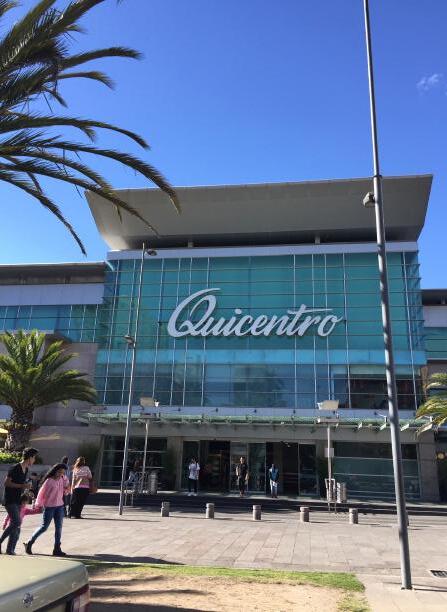
• Centro Comercial El Bosque
• Granados Plaza
• Plaza Las Américas
North:
• Condado Shopping
• Portal Shopping
South:
• Centro Comercial El Recreo
• Quicentro Sur
Cumbayá:
• Scala Shopping
• Paseo San Francisco
Los Chillos Valley:
• San Luis Shopping
CINES:
Los cines más comunes a los que acude la comunidad universitaria son: Supercines, Cinemark y Multicines. Puedes descargar las aplicaciones de estas compañías para ver la ubicación de los cines más cercanos a tu lugar de residencia, ver la cartera semanal y hasta comprar en línea tus entradas y snacks.
MOVIE THEATERS:
Movie theaters most commonly visited by the university community are: Supercines, Cinemark, and Multicines. You can download the applications from these companies to review the location of the closest movie theaters to your accommodation, see the movies being shown, and even buy your tickets and snacks online.
SPORTS:
Soccer
Soccer is the most popular sport in Ecuador. You can visit the main stadiums around the city to watch a game, which can be the national team or the local teams. The stadiums which you can visit are:Estadio Olímpico Atahualpa, ubicado en el sector centro norte de Quito
37
• Estadio Olímpico Atahualpa, located in the central northern area of Quito.
• Estadio Rodrigo Paz Delgado, located in the northern area of Quito.
• Estadio Gonzalo Pozo Ripalda, located in the southern area of Quito.
• Estadio Banco Guayaquil, located in the Valle de Los Chillos are. For more information about games visit:
https://www.fef.ec/
https://www.ligapro.ec/
Horse Riding
You can have access to horseback riding lessons, equine therapy rides, and horseback riding in several places dedicated to these activities in Quito. For example: Quito Ecuestre.
Swimming
The Ministry of Sports provides the possibility of practicing swimming in their facilities which are equipped with a pool, sauna, Turkish bath, and a whirlpool bath. To have access to the facilities you must have a swimming cap, swimsuit, sandals, towel, lock for your locker and you must pay USD 2 at the entrance. The business hours are from Tuesday to Thursday from 6:00 am to 8:00 pm, Saturday and Sunday from 7:00 am to 5:00 pm, while on Mondays it is closed. It is located in Gaspar de Villaroel E10-22 and 6 de Diciembre Ave.
RECREATIONAL ACTIVITIES CLOSE TO QUITO:
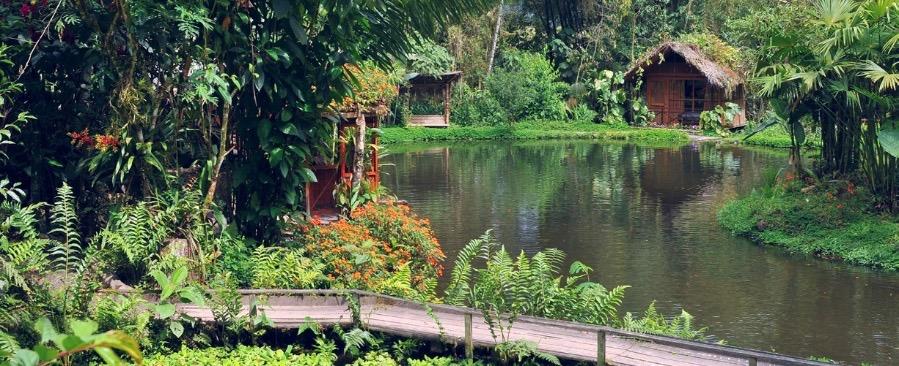
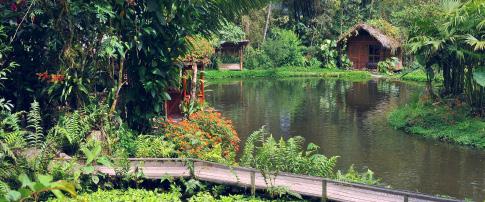
Mindo:
Mindo is a town located two hours away from Quito, it has a hot and humid climate. The area is made up of a cloud forest and is an ideal location for birdwatching, as well as orchid and butterfly watching. Additionally, it is a lodge destination, which are fully equipped wood or bamboo houses that are located in the middle of nature.
• La Casa Amarilla hike paths: They are hike paths that begin in town and take, approximately, three hours to complete. It is recommended that you hike in the morning to birdwatch.
• Waterfall Hike and Cable Car: To get to the Nambillo Waterfall (refreshment
38 HANDBOOK FOR INTERNATIONAL STUDENTS
and picnic area) and the Sanctuary of Las Cascadas (5 small waterfalls), you can do it using a Cable Car. The hike takes between three or four hours. These activities are not free of charge.
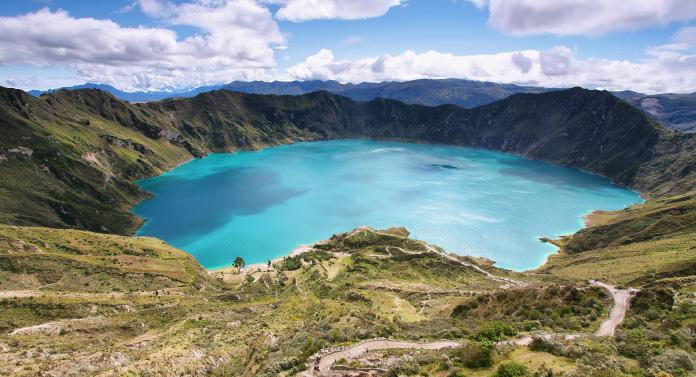
Papallacta Springs:
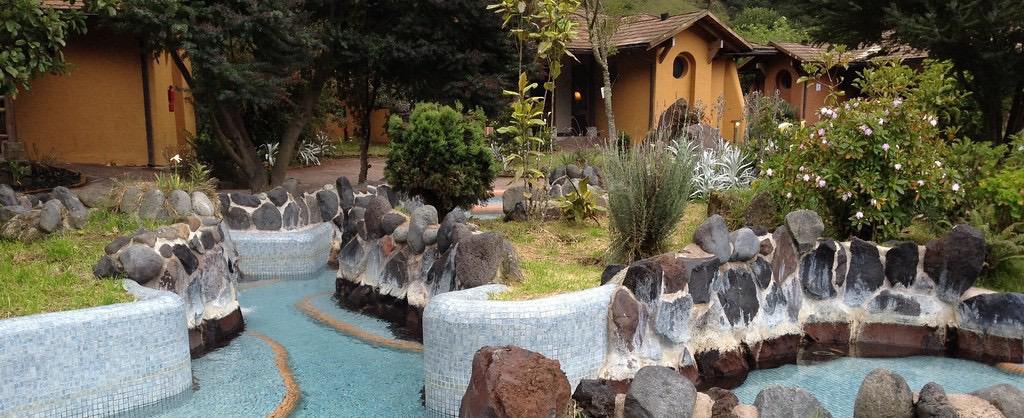
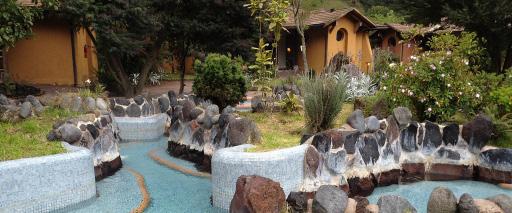
Papallacta is found in the Andean moor within a volcanic complex called Chacana, which is made up by a large
volcanic crater of 35 kilometers north-south and 15 kilometers north-south. The thermal springs rise from deep geological layers through fissures until they reach the surface and feed the Papallacta springs.
For more information visit: https://www.termaspapallacta.com/
Quilotoa Lake:
Quilotoa is one of the 15 volcanic lakes, inside its crater a cauldron has formed with a diameter of almost 9 km (5.6 mi) and 250 m deep, forming a lake. The minerals give it a greenish and bluish tone when it receives the impact of sunlight, inside the lake there are springs that, from the shore, can be perceived as bubbling trails that rise to the surface.
39
Cotopaxi National Park:
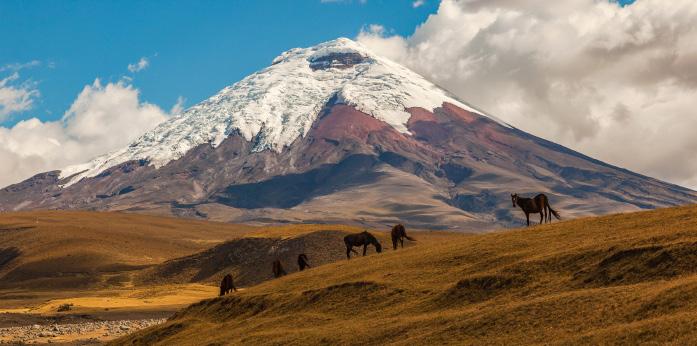
Cotopaxi volcano at 5,897 meters (19,347 ft) is one of the highest active volcanoes in the world and is considered a protected area, which includes two smaller sections, Morurco (4,880 meters above sea level, or 16,010 ft), next to Cotopaxi, and Rumiñahui (4,722 meters above sea level or 15,492 ft). Cotopaxi is found in the “Avenue of the Volcanoes”, which is a set of volcanoes in the Central Northern Highlands of Ecuador that received its name from German naturalist Alexander Von Humboldt in 1802. The ecosystem of this park is the moor, with its characteristic flora and fauna, such as grasslands and small shrubs.
For more information you can visit the official park webpage:
https://www.ambiente.gob.ec/areas-protegidas-y-sus-sitios-habilitados/
Otavalo (Imbabura):
Otavalo is known as the “Intercultural Capital of Ecuador” due to its cultural and historical wealth and because it is the home place of the Otavalo Kichwa People.
This place is located in the province of Imbabura, famous for its textile and commercial skills, characteristics that have given rise to the largest indigenous handicraft market in South America, called “La Plaza de Ponchos”.
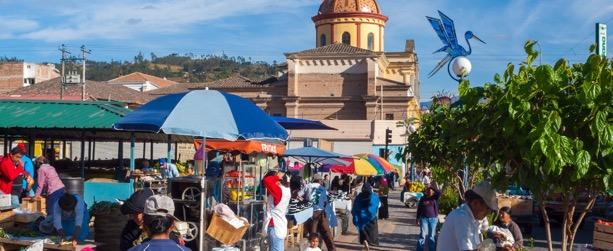
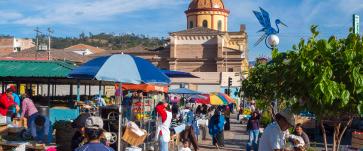
40 HANDBOOK FOR INTERNATIONAL STUDENTS
Tena / Puerto
Misahuallí:
Tena is the capital city of the Province of Napo, known as the “Capital of the Orchid, Guayasa and Cinnamon” or
“Capital of the Cinnamon Country”. There are several activities here such as hiking in the Jumandy Caves, Misahualli, Ahuano, Pano, Alto Tena, Rio Tena, Las Sogas, Cotundo, or the La Laguna Azul. To visit these locations, it is recommended that you use a tourist guide.

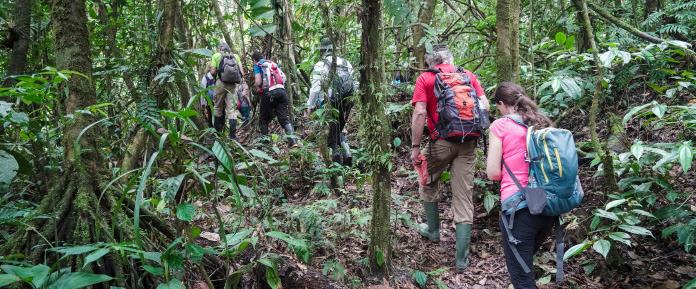
Baños de Agua Santa:
Baños de Agua Santa is located in the province of Tungurahua, 180 km from Quito, the capital city of Ecuador. This touristic city is located in a valley with waterfalls and thermal springs next to Tungurahua Volcano, which has an altitude of 5,016 meters above sea level (16,456 ft). In this place you will find spaces to relax, hot springs pools and spas, adventure, extreme sports such as rafting, climbing, canyoning, canopy, trekking, mountain biking, or bungee jumping.
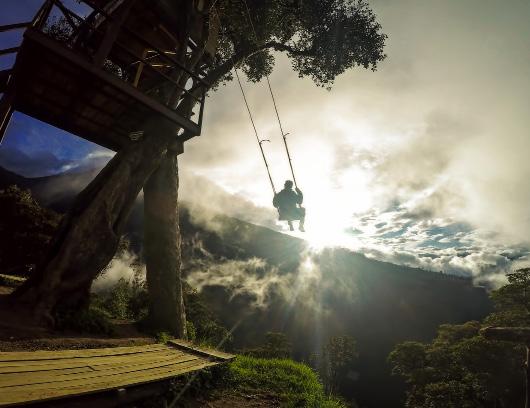
41
ACADEMIC INFORMATION UDLA EXCHANGE PROGRAM
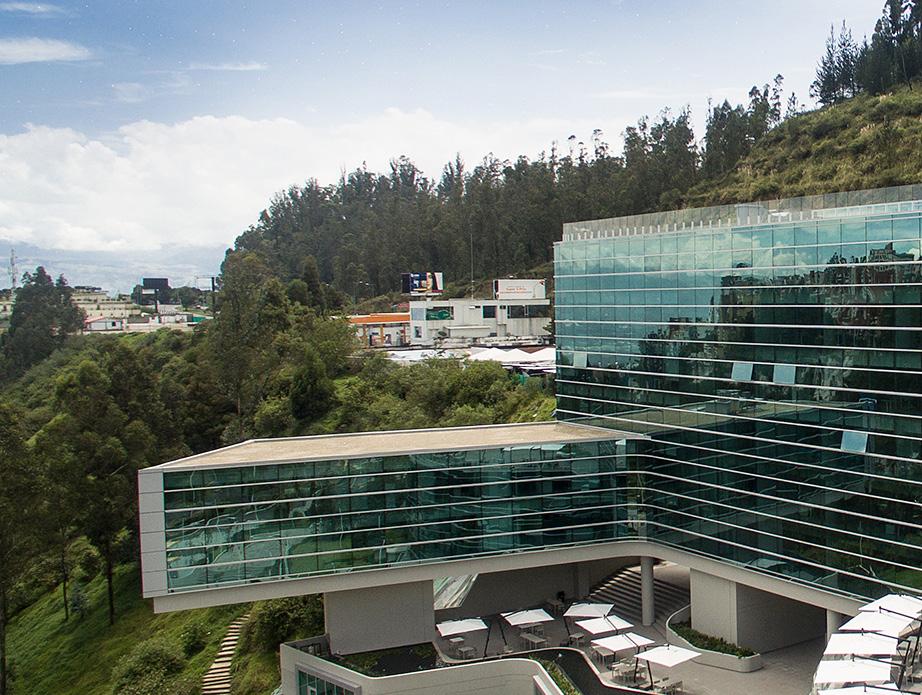
Your university life begins at the moment when you receive your exchange student acceptance letter from UDLA. As such, at the time of your application you should select courses from a program that is most similar to what you studied at your university of origin, although we offer you the possibility of taking courses from other programs, languages, or general training courses.
Upon receiving your application, International Programs issues an acceptance letter, and your enrollment process begins so you can be an UDLA student. During this process you will receive an e-mail with the access to the UDLA Payments Portal where payments for UDLA educational services are made.
If you are an exchange student, you will not have to make payments to UDLA for enrollment and tuition fees for your exchange semester, because the bilateral agreements in place determine that students pay at their university of origin.
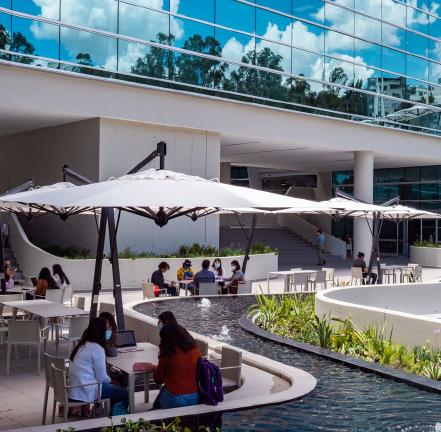
If you are a Free Mobility student (outside any agreement), you will be able to access the Payments Portal and review the amount to pay according to the program you were included in.
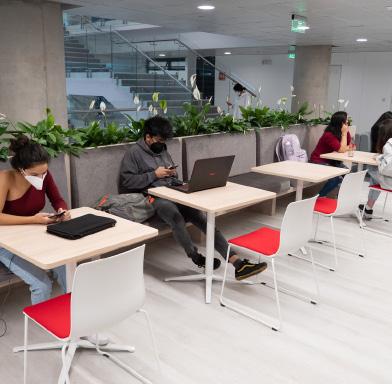
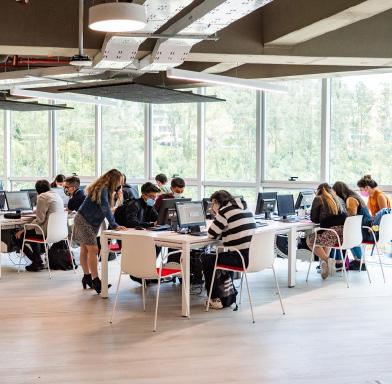
42 HANDBOOK FOR INTERNATIONAL STUDENTS
UDLAPark Campus
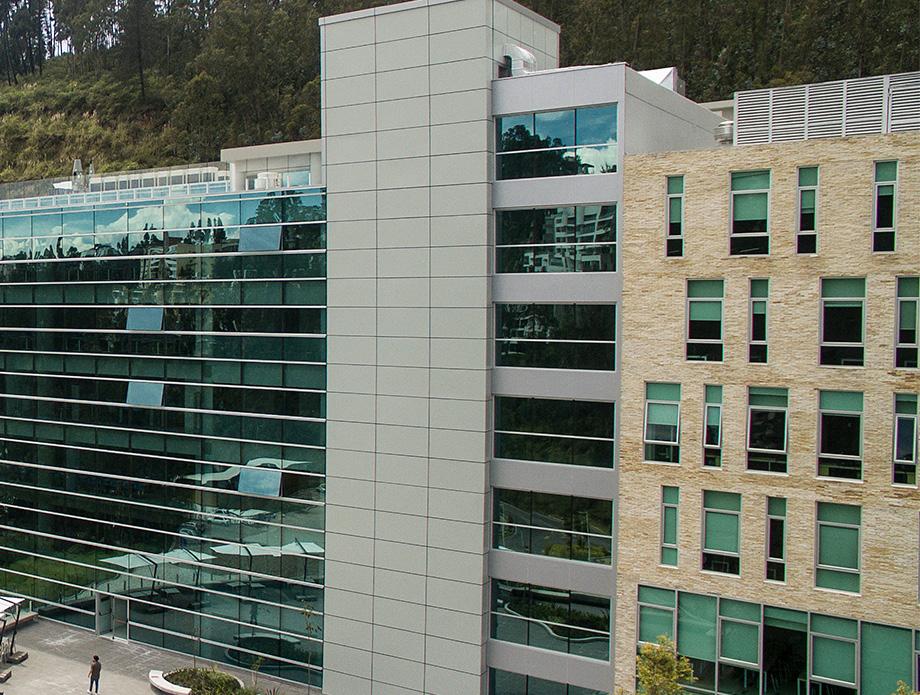
25.223 m 2 Colleges and Schools:
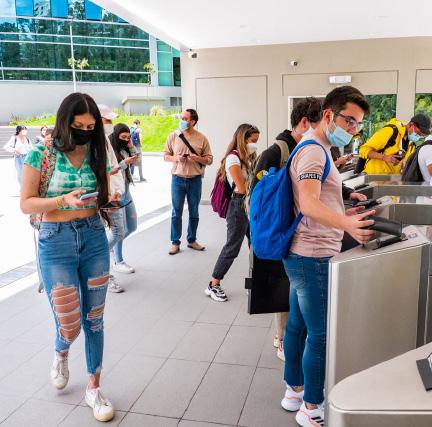
• Health Sciences.
• Medicine.
• Communications and Audiovisual Arts.
• Engineering and Applied Sciences.
• Law.
• Economic and Administrative Sciences.
• Postgraduate Studies.
• College of General Training.
• School of Psychology.
• School of Business.
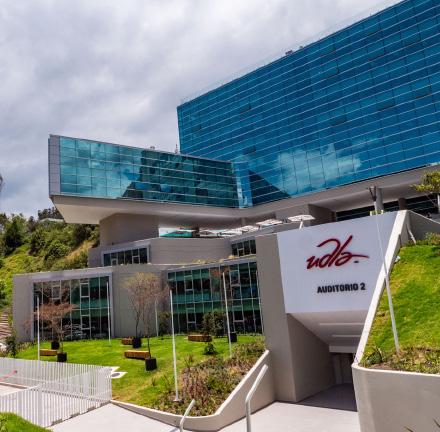
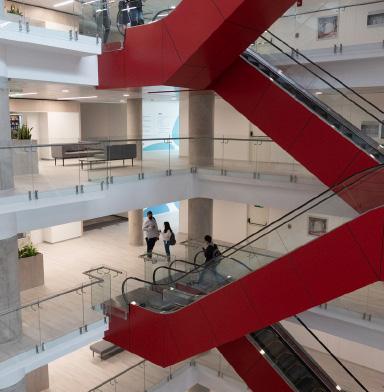
• School of Continuous Education.
• Research and Engagement.
• Research Laboratories.
• Clinical Simulation Center.
• Veterinary Simulation Center.
• UDLA Channel.
43
Infrastructure
Colón Campus
4959 m 2
• College of Dentistry.
• Dentistry Clinic.
Granados Campus
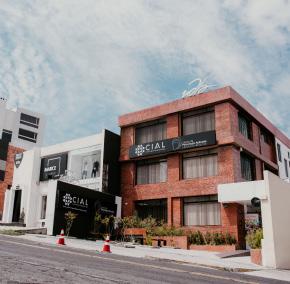
25.223 m 2
Colleges and Schools:
• Economic and Administrative Sciences.
• School of Music.
• School of Gastronomy.
• School of Hospitality and Tourism.
• School of Political Sciences and Foreign Relations.
• Children’s Library.
• CIE - Center of Economic and Entrepreneurial Research

Applied Learning Centers
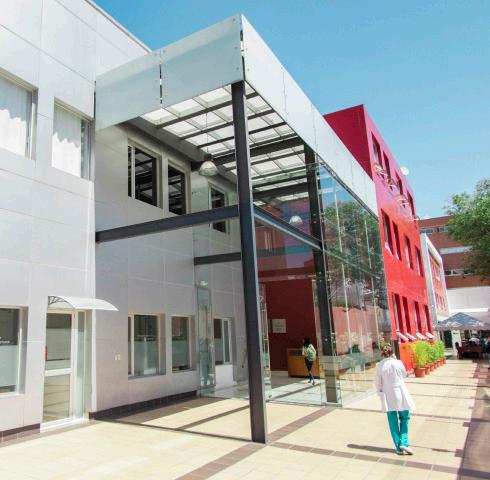
• Center for Legal Assistance (CIAL).
• Applied Psychology Center.
UDLA Farm
• • Agricultural Projects.
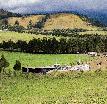
• • Livestock Project.
• • Waste Treatment.
• • Unit Operations.
44 HANDBOOK FOR INTERNATIONAL STUDENTS
STUDENT SERVICES LIBRARY SYSTEM
The “Carlos Larreátegui Mendieta” Library System provides the following services (directed to students, professors, administrative staff, and the community in general):
• Online catalog: The biographical collection allows users to search by title, author, subject, etc. In addition, it allows the search for articles and books in a digital format in the specialized and dissertation databases.
• Book loans: It allows users to have access to books and to use them outside the library for a specific period of time (3 to 8 renewable days) according to the established rules. Dissertation Projects, reference books (dictionaries, encyclopedias, and manuals) and journals are not object to being loaned out to be used outside of the library.
• Reading rooms: Rooms equipped with the necessary conditions to study/ read in every Library at the University.
• Cubicles for study groups: These are rooms that allow for privacy and are designed to provide the precise environment for group work.
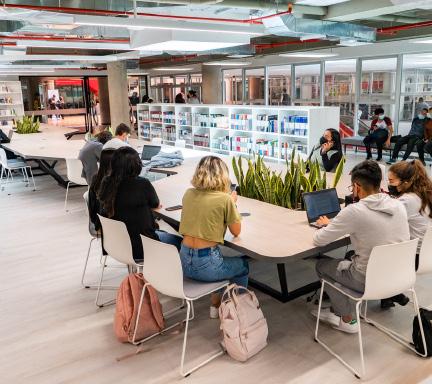
• Computers (PC and MAC): Libraries are equipped with PCs and MACs with internet access to allow for students to do their diverse projects with these IT tools.
• Scanning service: Available to students who wish to digitize journal and book images for their academic tasks.
• Information and reference services:
• Comprehensive and personalized user assistance in the search for the information necessary for the completion of academic tasks.
• Training in the use of virtual library resources.
• Support for students regarding bibliographical material for their Dissertation Project.
Library location:
• • Granados Campus: Ground Floor
•
• UDLAPark Campus: Ground Floor, Study Rooms on Underground Floor 5
• • Colón Campus: Ground Floor
Access to the virtual library: http://biblioteca.udla.edu.ec/
45
You may access the virtual library with your UDLA e-mail credentials
For more information and queries, please contact: biblioteca@udla.edu.ec
UDLA Clubs
University Clubs are available to the entire university community, including international students, whose stay is longer than 2 weeks and who wish to engage in extracurricular activities, according to their time availability, to develop skills and abilities as an important added value to their academic training. Clubs are held in the Granados and UDLAPark Campuses. There are over 40 options of cultural, artistic, sport, and community service clubs to pick from. Additionally, the club office provides the sporting equipment for students to use courts and ping pong
tables. To access this service, you will need to provide your identification and student card.
To sign up to clubs, international students must notify International Programs about the club they are in joining. For more information visit: https://www.udla.edu.ec/clubes/
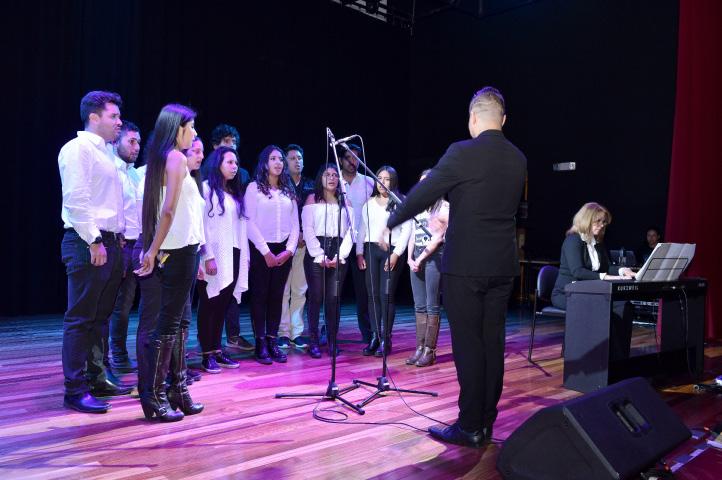
You can also follow the clubs on their social networks:
https://www.instagram.com/clubes_udla

https://www.facebook.com/clubesudla

MY CAMPUS PRINT
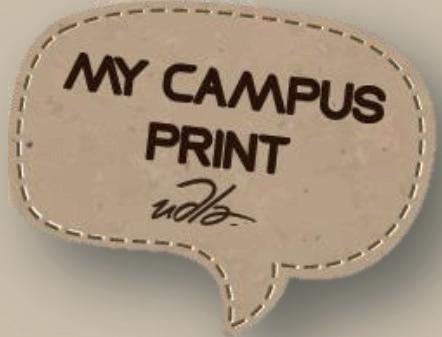
Is a system for all UDLA students and staff that allows them to photocopy and print all their documents from any mobile device or computer to printers located throughout the University’s campuses.
También incluye atención en centros copiados ubicados en todos los campus que brinda los servicios de anillado, escáner y copias e impresión en todos los formatos (desde A6 hasta A0).
The cost for printed sheets in A4 format as is follows:
• Black and White: 0.03 USD
• Color: 0.40 USD
46 HANDBOOK FOR INTERNATIONAL STUDENTS
MEDICAL OFFICES
UDLA medical offices are equipped with high-quality equipment to care for any emergency, and it is serviced by accredited medical personnel. It provides timely health care and has the necessary resources to offer primary health care, with emphasis on quality and warmth.
Cases that do not require hospitalization are treated. The services offered at the medical offices include:
• General Medicine
• Opening of a medical record
• Urgent Care
• Emergency care both at the office as well as where the emergency happens in the UDLA Campus.
• Ambulance transfer for patients when required
• Provision of the first dose drugs when necessary
• Prescription and delivery of medical prescription
• Nebulization service
• Medical examinations
• Specialist consultations
• Request of complementary and special lab exams.
• Treatments and minor surgeries
• Application of duly prescribed medicine
These services are available in every UDLA campus, and the business hours are from Monday to Friday from 08:00 am to 09:00 pm.
CAFETERÍAS
UDLA has selected a cafeteria service that guarantees quality in the preparation of food at the best price, providing service at all UDLA campuses.
47
AVAILABLE CAFETERIAS:
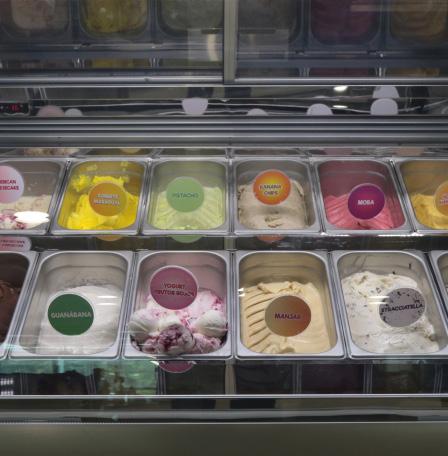
• Granados Campus:
• La Corteza. Ground Floor, North WingCampus UDLAPark:
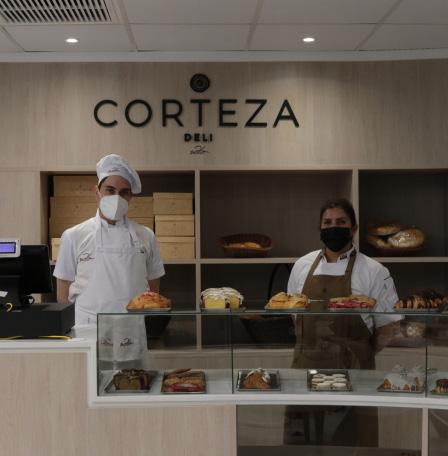
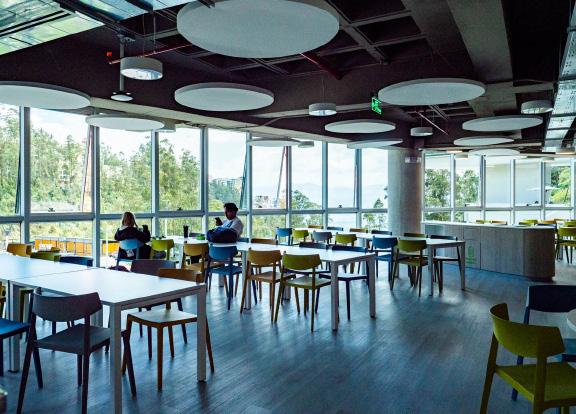
• Hanaska Catering. Ground Floor, North Wing
• UDLAPark Campus:
• Hanaska Catering. Underground Floor 1
• La Corteza.
• Underground Floor 2
• Chia: Ground Floor
• Colón Campus:
• Chia: Ground Floor
• La Corteza.
Cafeteria contacts:
supervisorgranados@grupohanaska.com
supervisorudlapark@gupohanaska.com
supervisorqueri@grupohanaska.com

cafeteriakapuli@hotmail.com
Business Hours: 07:00 am to 10:00 pm
48 HANDBOOK FOR INTERNATIONAL STUDENTS
ADDITIONAL SERVICES FOR THE UDLA COMMUNITY:
• Dental Care Center
• Legal Advice Center
• Applied Psychology Center
• Veterinary Clinic
• Rehabilitation and Physiothera py Center
Visit the Benefit Portal for the UDLA community and learn about all the benefits you have as part of our university community:
https://www.udla.edu.ec/app/beneficios/
BANNER UDLA ID EXCHANGE PROGRAM
During the enrollment process a Banner ID is issued. This will be your identification number at UDLA, and it is unique for every student. The structure of the code is as follows: A00XXXX. Remember your Banner ID, as it is very important for every process within the university. Your identification number for any academic or administrative process will be your passport number (including letters, if applicable).
WHAT IS BANNER?
BANNER is a world-class system that collects the best practices related to academic and administrative process management. Some of the benefits and advantages offered by BANNER are as follows:
Simplificación y optimización de los procesos académicos y administrativos
Sistema dinámico de reportes
Mayor seguridad y confiabilidad en la administración de datos académicos y administrativos
Mayor seguridad y confiabilidad en la administración de datos académicos y administrativos
Transversalidad de la información del ciclo de vida universitaria del estudiante
With the launch of BANNER, UDLA assumed a challenge, because it is an opportunity to grow and be at the forefront in the industry. One of the tools offered by BANNER is the Self-service Portal which will be mentioned below.
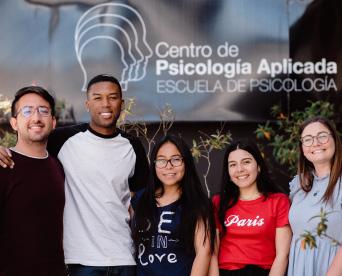
49
ACADEMIC LOAD (COURSE ENROLLMENT):
Students must identify an undergraduate program at UDLA that is the most similar to their program at their origin. The regular academic load for an UDLA student is of 6 courses per semester and in exceptional circumstances 7 courses. We recommend that international student have a load of between 5 to 6 courses per semester.
UDLA courses range from 2 to 6 credits and there are between 2 to 6 academic hours per week. International students may course different courses from different programs and levels. Nevertheless, it is recommended to course at least 3 subjects from the program the student is linked with, and the rest may be coursed in subjects from other programs (including different colleges/schools)
UDLA has the following academic offering. Every program has a duration of 8 or 9 semesters. Courses are offered equally in every semester. Architecture is composed of 9 semesters, while Medicine has 12. All programs are offered in the onsite modality.
The colleges / schools at UDLA recently updated their plans of studies. The courses offered are currently being offered in the degrees to be closed and in the degrees in force.
It is important to determine that some colleges/schools have programs offered during the day and at night. However, in the case of some colleges, such as the College of Economics and Administrative Sciences and some courses of the College of Engineering and Applied Sciences, the second part of the course is taught in the afternoon or evening to give national students the opportunity to work or do their pre-professional internships.
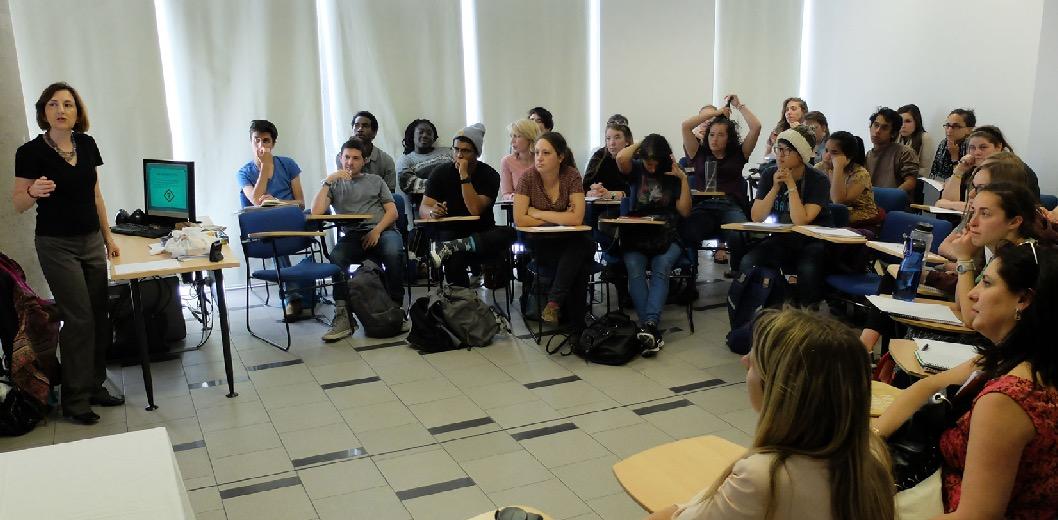
Course schedules are known a few weeks before the beginning of each semester, so International Programs will verify the schedules and availability of places in each course you request to take and if there is any conflict of schedule or lack of places will inform you to look for other alternatives that may be of interest to you.
Upon arriving at UDLA, International Programs will provide you with your schedule and help you find the location of classrooms in each Campus of the University.
International students are restricted from coursing dissertation subjects and pre-professional practices.
50 HANDBOOK FOR INTERNATIONAL STUDENTS
CURRENT ACADEMIC OFFERING:
The current programs offered at UDLA are the following. Some of them include programs in extinction which are only offering courses of the last year of the program. Contact International Programs regarding the extinct degrees that offer courses during the semester that you will have your exchange.
SCHOOL OF POLITICAL SCIENCES AND INTERNATIONAL RELATIONS
• Political Sciences
• International Relations
SCHOOL OF HOSPITALITY AND TOURISM
• Tourism
• Hospitality and Hotel Industry
SCHOOL OF GASTRONOMY
• Gastronomy
SCHOOL OF MUSIC
• Musical Arts
SCHOOL OF PSYCHOLOGY
• Education
• Clinical Psychology
• Psychology
COLLEGE OF ARCHITECTURE AND DESIGN
• Architecture
• Interior Design
• Product Design
51
COLLEGE OF ECONOMICAL AND ADMINISTRATIVE SCIENCES
• Business Management
• Economics
• Finance
• Sports Management
• Marketing
• International Business
• Digital Business
COLLEGE OF HEALTH SCIENCES
• Nursing
• Physiotherapy
• Veterinary Medicine
COLLEGE OF COMMUNICATION AND AUDIOVISUAL ARTS• Cine
• Cinematography
• Communications
• Graphic Design
• Multimedia and audiovisual production
• Journalism
• Publicity
COLLEGE OF LAW
• Law
COLLEGE OF ENGINEERING AND APPLIED SCIENCES
• Agro-industrial Engineering
• Environmental Engineering
• Biotechnology Engineering
• Electronic and Automation Engineering
• Software Engineering
• Sound and Acoustics Engineering
• Information Technologies Engineering
52 HANDBOOK FOR INTERNATIONAL STUDENTS
• Telecommunications Engineering
• Industrial Engineering
COLLEGE OF DENTISTRY
• Dentistry
COLLEGE OF MEDICINE
• Medicine
COLLEGE OF GENERAL TRAINING:
This college is in charge of providing cross-cutting courses for all programs at the university. It is made up of 3 schools which are: Humanities, Physical Sciences, and Mathematics and Languages.
SCHOOL OF HUMANITIES
The new Model of Comprehensive Training at UDLA has the objective of guaranteeing the complete development of students through the articulation of cross-cutting courses: FGHZ-0912 Economy, Ethos and Society; FGHZ-0922 Science, Environment, and the Human Being; FGHZ-0932 Citizenship, Culture, and History; and FGHZ- 0942 Art, Human Expression and
Community, with the hours of internships in engagement, which is equivalent to 48 hours of planning, preparation, execution, and evaluation of an engagement project in each course.
This seeks to promote the involvement of students with society, allowing them to come into direct contact with its needs and make their knowledge and skills available to solve social problems and complement their formative stage.
FGHZ-0912 ECONOMY, ETHOS, AND SOCIETY (Includes 48 hours of community engagement)
This course studies the fundamental concepts of economy, its interactions in society, and their considerations within axiological systems. It leads student to an analysis of socioeconomic and ethical issues. The development of this course is established stemming from the analysis of interrelations of the human being with themselves and with society in general. The learning method is the interrelation with society, research, and empirical study of economics.
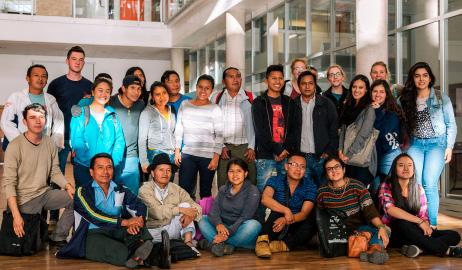
53
FGHZ-0922 SCIENCE, ENVIRONMENT, AND THE HUMAN BEING (Includes 48 hours of community engagement)
This course deals transversally with the human being (biopsychosocial being) in its relationship with the different types of scientific knowledge and in its environment (physical and social). The development of this course is established based on three problems: wellbeing, environment, and society.
FGHZ-0932 CITIZENSHIP, CULTURE, AND HISTORY (Includes 48 hours of community engagement)
This course approaches history and culture as cross-sectional tools to generate debate about the notion of citizenship. This implies approaching socially constructed concepts (culture, democracy, State, nation, gender, and ethnicity, among others) that cut across this category and make it possible to reflect on a discourse that harbors concerns, and expectations linked to the citizen’s way of proceeding and duty to be.
FGHZ- 0942 ART, HUMAN EXPRESSION, AND COMMUNITY (Includes 48 hours of community engagement)
This course provides basic tools for the development of a critical outlook and shared sensitivity with artistic expressions. Allows for an outlook of art as a human expression and as such, as a reflection of their cultural context. The development of the course is based on the analysis of creativity and human expression in all its artistic forms.
Additional cross-sectional courses offered by the School of Humanities:
FGL-0180 RESEARCH AND ACADEMIC TEXTS
In this course, academic texts will be constructed in which relevant information is synthesized with appropriate language, structure, and style, based on the selection and critical analysis of academic information.
FGL-0192 LANGUAGE AND DIGITAL COMMUNICATION
This course favors the construction of strategies for a rigorous and critical approach to diverse texts, in order to develop critical thinking and communication using technological tools that facilitate the selection, generation and use of information with a pertinent use of language.
To review the courses in this school visit: http://blogs.udla.edu.ec/comunicacionylenguaje/
SCHOOL OF LANGUAGES ENGLISH
The English program at UDLA is designed in accordance with characteristics of the Common European Framework of Reference (CEFR), with the support of Cambridge University Press. The English program prepares students to reach a B2 level.
Taken from: : https://www.eaquals.org/our-expertise/cefr/
54 HANDBOOK FOR INTERNATIONAL STUDENTS
Placement exam:
The placement exam is a requisite to enroll in an English course. If you request this course, International Programs will coordinate with the School of Languages to assign a date for you to take the placement exam and identify your corresponding level.
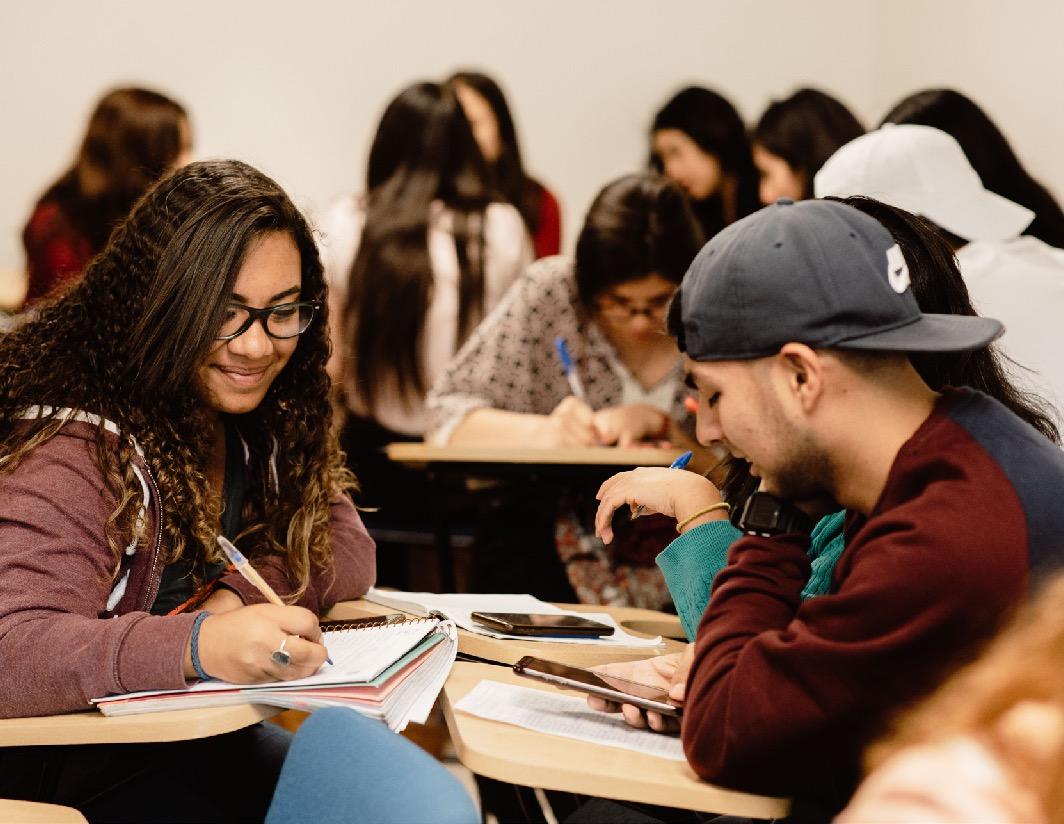
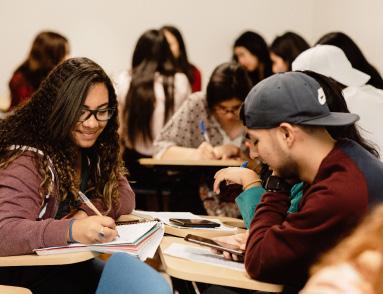
The day of the exam, the student must show two updated identifications (with a photograph) to verify their identity. These can include the UDLA card, identification card, driver’s license, or passport.
If there is any problem relating this requisite, the student must go to the School of Language office to solve it prior to the exam day.
55
To learn news or information about this school visit: http://blogs.udla.edu.ec/escueladeidiomas/
SCHOOL OF PHYSICAL SCIENCES AND MATH
Code Banner Course
MAT-0111
for Architecture
MAT-0339 Introduction to Calculus
MAT-0014 Quantitative Language
MAT-0017 Quantitative Language
MAT-0327 Mathematics for Administration and Economy
CALCULUS AND ALGEBRA
Code Banner Course
MAT-0341 Calculus I
MAT-0338 Differential Calculus
MAT-0334 Differential Calculus
MAT-0221 Linear Algebra
MAT-0342 Calculus II
MAT-0343 Calculus Complements
MAT-0346 Differential Equations
56 HANDBOOK FOR INTERNATIONAL STUDENTS
Banner Course CEFR Level ING-0001 Basic English I A1.1 ING-0002 Basic English II A1.2 ING-0111 Intermediate English I A2 ING-0222 Intermediate English II B1 ING-0333 Advanced English I B2.1 ING-0444 Advanced English II B2.2 ING-0555 English for Business B2.3 EIA-0056 Academic English for foreign relations B2.3
Code
Mathematics
STATISTICS
Code Banner Course
EST-0220 Direction of Operations
EST-0055 Probability and Statistics
EST-0065 Applied Statistics
EST-0021 Statistics
PHYSICS
Code Banner Course
FIS-0121 General Physics
GEOMETRY
Cód. Banner Materia
FADR-2123 Descriptive Geometry
To review the contents of the courses from this School visit: https://blogs.udla.edu.ec/matematica/materias/
LANGUAGE LEVEL
Spanish is the official language of Ecuador. As such, UDLA courses are taught in this language. For this reason, we require that international students have a proficiency of Spanish so they can pass their courses and adapt to Ecuadorian culture with greater ease. The minimum level requested for international students is a B1.2 according to the CEFR.
SPANISH COURSE
Before starting your exchange semester, UDLA offers you a Spanish as a foreign language course (intermediate level) which lasts 20 hours so you can contextualize yourself with the language and Ecuadorian culture. This course is taught during international student orientation week. If you want to improve your Spanish level, we suggest you take additional classes at our Spanish School, before, during, or after your exchange semester. We will talk about our Spanish school further ahead.
57
COURSES IN ENGLISH
UDLA has been successively incorporating courses taught in English in several colleges/schools. Currently the courses offered can be found in the International Relations and in the Hospitality and Tourism programs.
SCHOOL OF POLITICAL SCIENCES AND INTERNATIONAL
INTERNATIONAL RELATIONS
Banner Code Course
RIIZ3553
Political Problems Seminar I (International Conflict: Why nations go to war)
Observations
RIIZ4886
International Political Problems Seminar IV (Soft Power and Implementation of Public Diplomacy)
POLITICAL SCIENCES AND INTERNATIONAL RELATIONS
Banner Code Course
POLZ4460
International Political Problems Seminar VII (Multinational corporations and the State)
Observations
POLZ4470
International Political Problems Seminar VIII (Arab Spring and Middle East Policy)
SCHOOL OF HOSPITALITY AND TOURISM
HOSPITALITY AND HOTEL INDUSTRY
Banner Code Course
HOSZ3159
HOSZ3394
HOSZ3152
EHTZ3479
Food and Beverage Management
Human Resources
Marketing and Communication
Costumer Experience Management
SCHOOL OF HOSPITALITY AND TOURISM
CLINICAL PSYCHOLOGY:
Banner Code Course
PSIC3804
Palliative care in Psychology
Observations
Observations
58 HANDBOOK FOR INTERNATIONAL STUDENTS
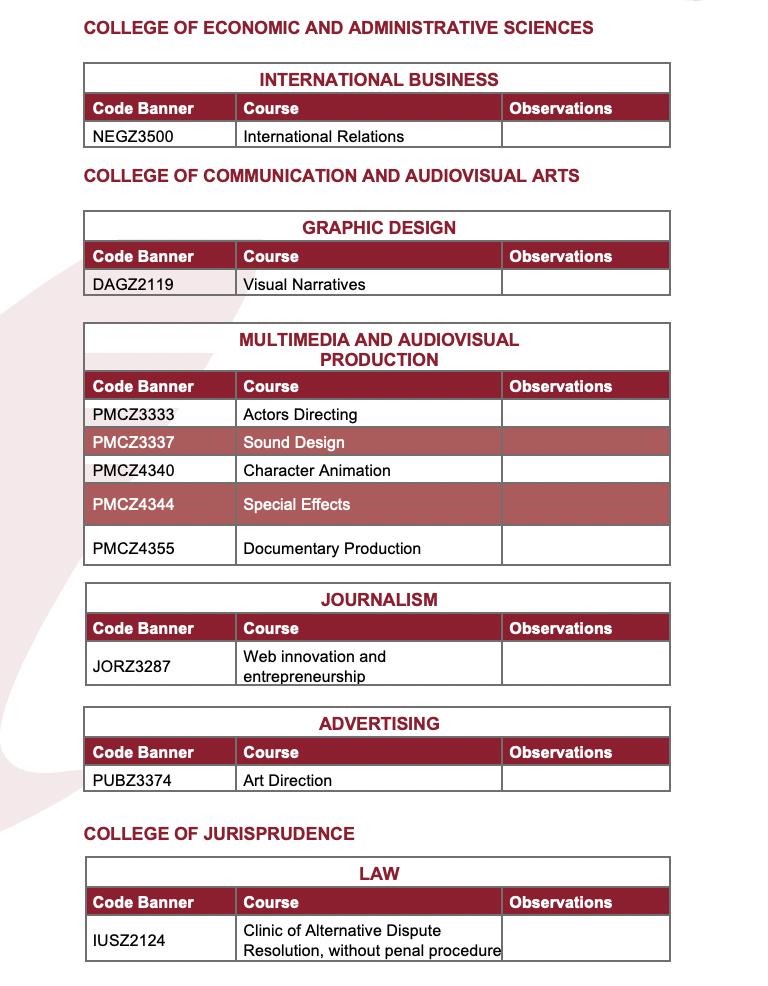
59
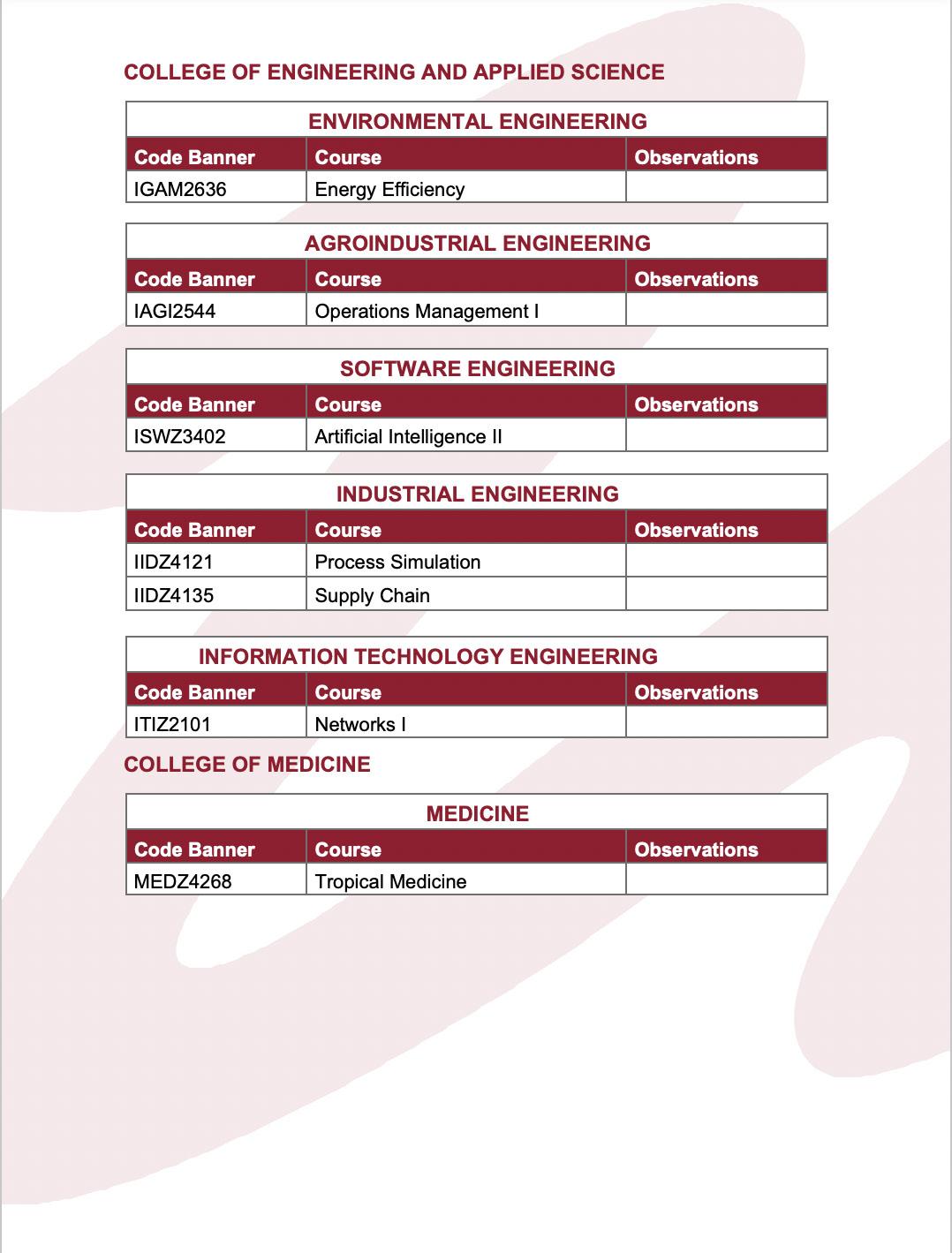
60 HANDBOOK FOR INTERNATIONAL STUDENTS
COMMUNITY ENGAGEMENT
UDLA, in the search for alternatives to develop higher education strategies adapted to the needs of society, seeks to train students with a comprehensive graduate profile that promotes values and generates social awareness.
For this reason, there is an area of Community Engagement that is an active part of the university’s activities, being the channel through which the university contributes with solutions to practical problems of society, through the involvement of the UDLA community in activities that support the community, complying with national objectives and policies.
ENGAGEMENT PROJECTS:
Engagement projects seek to address the needs or problems of society, with the participation of students in activities pertinent to their careers, and with the guidance of teachers, and these activities are evaluated to meet the institutional learning outcomes.
To participate in engagement projects, you must select one of the following courses: FGHZ-0912, FGHZ-0922, FGHZ-0932, FGHZ-0942 mentioned in the section belonging the College of General Training.
ACADEMIC ASSESSMENT
UDLA divides its academic year in two semesters. The first semester begins at the end of September and finishes mid-February. On the other hand, the second semester begins at the end of March and ends mid-July.
Each academic semester at UDLA is made up of 3 assessments. Each assessment tests a part of the course content. The assessment system at UDLA is continuous, so assessments are made throughout the semester, and the percentage of assessment is distributed as follows:
61
First Assessment: 25% of the assessment First Assessment: 35% de la evaluación First Assessment: 40% of the assessment
GRADE RANGE AND EQUIVALENCES
For all assessment systems, there is a unified grade scale. The main grade to pass is 6.0
ATTENDANCE POLICY
Class attendance is mandatory.
Absences to class have an impact on the student’s grade based on the following parameters:
1. 1. Every course will have an attendance component
2. 2. The impact of absences must not exceed 10% of the total of the final grade of the course, nor of any of the progress.
3. 3. It is recommended (but not mandatory) that this effect be distributed throughout the different assessments.
4. 4. Every college/school shall determine the effect that class attendance shall have to the grade of each assessment within every course. This policy must be transparent, included in the syllabus, and notified to the students on the first day of class. The policy may not change during the semester.
POLICY ABOUT RECOVERY EXAMS
The implementation of a recovery exam shall be done following these parameters:
1. 1. The recovery exam may only be offered to replace a component of an assessment where another assessment evaluation was a written exam (it does not apply for essays, projects, or an assessment type that is different to an exam).

2. 2. Students who have an attendance of at least 80% until the final week, have the right to take a recovery exam
MODIFICATIONS TO THE ACADEMIC LOAD
International students could change their academic load (add or change courses) until Friday during the second week of classes. Additionally, they may eliminate
62 HANDBOOK FOR INTERNATIONAL STUDENTS GRADE EQUIVALENCE 9.0 to 10.0 Excellent 8.0 to 8.9 Very Good 7.0 to 7.9 Good 6.0 to 6.9 Sufficient 1.1 to 5.9 Insufficient 1.0 Absent
a course from their academic load until Friday during the fourth week of classes. After these periods elapse, modifications may not be made, except for cases of force majeure.
JUSTIFICATION OF ABSENCES
Every student may request for a justification of their absence in the following cases:
• Illness or health issues will be justified for the medical rest period established in the corresponding certificate.
• Domestic bereavement, which is understood as the death of a family member up to the third degree of consanguinity or first degree of affinity. Up to three (3) days will be justified.
• Official representation of the University, province, or country in sports, academic, or social events will be justified for the period of the representation.
To carry out the justification, the student must submit a request using the BANNER Self-Service Portal which will be detailed below.
Under no reason is it justifiable to be absent from class during assessment periods to carry out tourism trips. Take advantage of the national holidays and weekends or plan to stay in Ecuador after ending your semester to have longer trips that do not affect your attendance to classes.
EARLY TERMINATION OF YOUR EXCHANGE PERIOD
If for any reason you decide to return to your country of origin before the semester exchange ends, you must notify it with at least one month of anticipation to the International Programs team and to your professors to coordinate the assessment of the pending assignments corresponding to your third assessment period.
If you do not finish your semester exchange onsite, you must take into account that you are waiving your right to sitting in a recovery exam in accordance with the previously mentioned policy.
ADDITIONAL EXPENSES DURING YOUR EXCHANGE
It is important that you consider that due to the nature of the activities in some colleges/schools, it is likely that the students have to cover additional costs during their exchange period. Some courses have academic tours or special events that you must attend or participate in. In other cases, you may require a uniform or specific clothes, as well as instruments, equipment, or tools to carry out the practical activities. This may require additional time and monetary investment. We have provided some examples below for you to better understand this context.
SCHOOL OF HOSPITALITY AND TOURISM
This school has a dress-code for its students, which must be used in accordance with the implementation schedule provided. If you are linked to any of these pro-
63
grams, you must comply with this policy. You may bring your clothes from your country of origin.
Additionally, this school carries out some academic tours related or unrelated to the program courses. Generally, these tours are made at the end of the semester or during special occasions, like on the weeks prior to Christmas. The school will notify these activities in advance for the planning of the dates and costs of the trips.
SCHOOL OF GASTRONOMY
Due to the nature of the practical activities held at this school, a kitchen uniform must be acquired, together with anti-slip shoes, and basic utensils for the practice of gastronomy. Keep in mind that students who course this program, purchase these articles for their whole academic program (4 years). For an exchange student to assume these costs for 1 or 2 courses may not be worthwhile unless you take a whole semester or academic year at this school, but if you are studying in the hospitality field, they will always be useful for your professional development.
Likewise, the courses have planned the provision of ingredients and supplies by the school for all practical exercises and practical assessments. However, if an extraordinary or complementary assessment is required, or if you do not attend the scheduled date, you must bear the costs for the purchase of the ingredients.
COLLEGE OF HEALTH SCIENCES / COLLEGE OF MEDICINE / COLLEGE OF DENTISTRY
The programs in these colleges require a uniform which may be a full body uniform or an accessory like a lab coat. Additionally, depending on the subjects coursed, the purchase of instruments and specific class materials will be required. Just like we mentioned for the gastronomy section, assuming these costs for 1 or 2 courses may not be worthwhile.
COLLEGE OF ENGINEERING AND APPLIED SCIENCES
The programs in this college require the use of a lab coat for the activities in the practical areas. Likewise, some programs have field trips, technical tours, and activities outside the UDLA which require the use of certain elements like overalls, boots, among others. Likewise, in some courses, certain specific materials must be bought for the practical activities.
COLLEGE OF ARCHITECTURE AND DESIGN
The activities of the programs in this college require the continuous acquisition of materials to make models, prototypes, or designs to present in class. Even though this is not for every course, those that have a practical or execution component will require teamwork, specialized printouts, and the purchase of materials.
There may be other cases in other colleges/schools. Contact International Programs if you require information about a particular program.
64 HANDBOOK FOR INTERNATIONAL STUDENTS
SCHOOL OF SPANISH
UDLA has the School of Spanish to teach the Spanish language through courses in various modalities, with flexible schedules, and included class materials. It is part of our School of Continuous Education, and it provides an excellent opportunity to improve your Spanish language knowledge and even obtain a certification in a level in accordance with the European Framework.
CERVANTES INSTITUTE ACCREDITATION:
The School of Spanish at the Universidad de las Américas is the only center in Ecuador that is accredited by the Cervantes Institute, which is the official body of teaching Spanish as a foreign language. It is an examination center for the DELE, SIELE, and the Spanish Nationality - CCSE exams of the Cervantes Institute.
We offer Spanish classes to our students and international professionals, which need to learn and/or perfect their linguistic abilities in this language.
The study programs are custom-designed and taught by highly qualified Spanish-speaking teachers with more than 20 years of experience in teaching this language. Additionally, the School of Spanish at UDLA offers a flexibility of schedules, as well as dynamic and participative classes using a communicative and intercultural learning methodology.
PREFERENCIAL FEES FOR STUDENTS IN UDLA INTERNATIONAL PROGRAMS:GRAMS:
The Spanish School at UDLA offers 20-, 40-, and 60-hour courses for foreign students that participate in international programs offered by UDLA at preferential prices. These courses have a 1,2-, or 3-week duration and it is recommended that you course them at the start of your exchange semester or upon completion of the short international course.
The courses designed for students participating in international programs include:
• Enrollment in the course.
• Placement exam and Spanish level.
• Class textbooks and materials.
• Completion certificate
For more information visit: https://bit.ly/40cTKrg
To contact our school, e-mail: espanol@udla.edu.ec
Remember to tell us you are an exchange student!
65
UDLAMIGOS- BUDDY PROGRAM
UDLAmigos is a buddy program that seeks to foster cultural exchange and to integrate international students to the day-to-day life in the country, in Quito, and at UDLA.

Before your arrival to Ecuador, we will send you contact information of your UDLA Buddy so you will have the opportunity to ask them any question prior to your arrival. During your first day at UDLA, we will set-up a meeting between the international students and the UDLA Buddies so they can meet in person. They will be your first student contact at the university.
With your UDLA Buddy, you will have the opportunity to:
• Have a contact / friend in Ecuador before your arrival.
• Be part of the different activities and experiences offered by UDLA, Quito, and Ecuador.
• Familiarize yourself with the university (main offices, classrooms, laboratories, professors) and how to use the services (where to make copies, how to check-out a book from the library, etc.)
• Get to know the city (how to use public transportation, places to eat/have a coffee, avoid dangerous areas and other risks, try different typical foods, and go out with friends)
• Learn about Ecuadorian culture
• Practice your Spanish
• Clarify any doubt / question you may have, receive a second opinion, and receive help from a study partner.
• Share your own culture
International Programs shall do their best so that your UDLA Buddy studies in the same program or same school/college that you will be enrolled in.
VIRTUAL OFFICE 365 TOOLS
Upon your enrollment as an UDLA exchange student, an e-mail account will be created for you using the domain name.lastname@udla.edu.ec. This account is managed by the IT Support area of UDLA, and it has all the benefits and tools of Microsoft 365
access www.office.com and discover how Microsoft 365 in not only an e-mail tool,
66 HANDBOOK FOR INTERNATIONAL STUDENTS
but rather it allows us have access and share information from any location or device.
• E-mail with an inbox capacity of 50 GB.
• Install Word, Excel, Power Point, and other Microsoft software on your computer.
• 1 Terabyte of OneDrive capacity to upload and visualize all the information stored online.
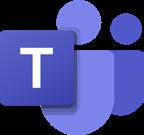

• You may have HD video conferences using Teams.
• Access additional systems, such as BANNER.
• Create class notes using the Notes application.
• Make surveys with an automatic grading in Forms.
• Participate in group sites with SharePoint.

• Keep all your data safe on the cloud.
• Access your data from anywhere.
• Work on the same document (Word, Excel, Power Point) at the same time from two different computers.
You will receive an e-mail on your personal address with your username and provisional password to access your Microsoft 365 for the first time. This process will be done between 2 to 4 weeks before starting your exchange semester. If you have difficulties or did not receive the message in your personal inbox, contact International Programs so our IT Support area can help you with your process.
ONLINE EDUCATION / VIRTUAL CLASSROOM


Every course at UDLA has a virtual support classroom. Here students may carry out different activities such as:
• Turn in homework
• Review the syllabus from courses
• Review your grades
• Obtain support materials
Through the website shorturl.at/nLP68 students may enter their classrooms on the Brightspace platform where they will have access to guides, tutorial manuals, FAQ, platform use videos, etc.
It is important to remember that all activities created on the platform by teachers have a deadline date and time, it is recommended to do them in advance and in case of problems take screenshots as evidence to deliver them to technical support.
67
To ask questions e-mail: soportevirtual@udla.edu.ec
MICROSOFT TEAMS
Allows you to connect from anywhere that has internet access.
UDLA uses this application to continue its academic activity, when on-site activities may not be carried out due to situations outside of the university’s control.
Video tutorial to install Teams: https://bit.ly/403ghHc
Video tutorial about how to use Teams for your classes: https://bit.ly/403ghHc
BANNER SELF-SERVICE PORTAL
Is a tool from the BANNER platform where you will have the opportunity to review your information and request academic processes.
Academic Information
• Student information (schedule, grades, absences)
• Load registration
• Academic registration
• Professor Evaluation
Academic service requests
• Historical grade transcript
• Regular student certificate
• Justification of absence
• UDLA Card Application
• Course elimination
• Inscription to clubs
To access you must enter the Banner Students section:
https://bit.ly/3lqsJSj
Video tutorial for the Banner Self-Service Portal: shorturl.at/fijJN
JOB BANK PLATFORM
Students who have Ecuadorian nationality, a permanent residence visa, or a temporary residence visa in one of the following categories may request access to the UDLA Job Bank Platform portal:
68 HANDBOOK FOR INTERNATIONAL STUDENTS
• Temporary resident - Unasur temporary visa granting
• Temporary resident - Mercosur temporary visa granting
• Temporary resident- Temporary Visa granting Ecuador-Venezuela Statutes
The UDLA Job Bank Platform’s main objective is to facilitate the labor placement of students, being the link between the student and the market (public and private organizations).
Students that are interested and that comply with the profile of a specific vacancy will apply and their curriculum’s will be automatically sent to the offering employer to be a part of their selection process.
UDLA’s Job Bank Platform is permanent and free of charge, both for the hiring company and current UDLA students and alumni from undergraduate and postgraduate studies of every academic program.
Currently, UDLA has close to 364 current cooperation agreements with companies from all the productive sectors (public, private, and NGOs), out of which 110 are specifically for pre-professional practices and internships.
If you comply with some of the conditions displayed above, it is important that you have an Ecuadorian identification document. For any additional query, contact: bolsadeempleo@udla.edu.ec
UDLA + APP
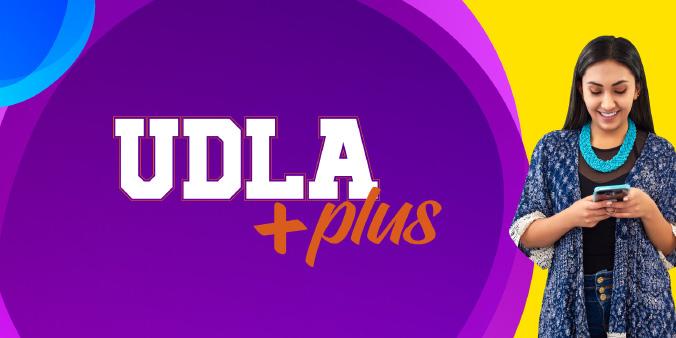
Upon downloading UDLA+ you may
• Check your grades
• Check your schedules
• See the location of classrooms
• Check your absences
• Know the real-time location of the inter-campus buses
• See the academic schedule
• Available for IOS and Android
LEARNING AND SUPPORT CENTER
Is an initiative created to support student’s processes through the application of various programs that provide guidelines and resources to improve their academic development.
The Learning and support center has spaces and resources designed to facilitate the application of their programs in a warm environment that is adapted to the needs of the learning support proposal. Additionally, it offers logistical support to the actions that are developed jointly with the academic units.
69
The Learning and Support Center has developed various support and learning programs such as: Support and Reinforcement Program, Learning Workshops, and Academic Boosters.
• Support and Reinforcement Program: It is a peer tutorship program (student-to-student) in subjects with a considerable percentage of deferred students from the School of Mathematics and from the Sound and Acoustics Engineering, Agro-industrial Engineering, Finance, Economics and Psychology programs.

• Learning Workshops: These are workshops oriented towards the development of learning skills through an approach to different topics.
• Academic Boosters: They are virtual learning support resources for academic support actions, they constitute a reinforcement of concepts and processes that should be learned in the previous training.
For more information visit: http://marketing.udla.edu.ec/app/centroaaa/ UDLA MENTOR
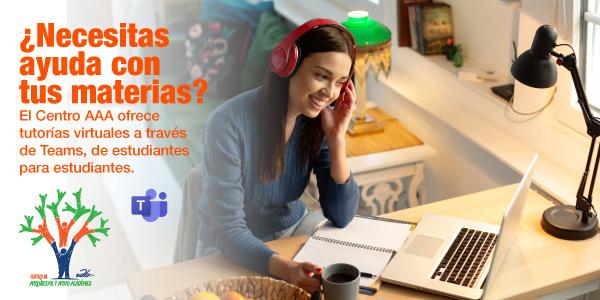
UDLA Mentor is a specialized support program for students throughout their university career.

Every student will have a Mentor who facilitates the management of your academic and administrative processes and will also provide you with a space to be listened and professional intervention.
At UDLA Mentor, students may be able to discuss topics related to Student Wellbeing, Financing, and Academic Secretary.
Everything in the same place!
HOW DO MENTORS HELP STUDENTS?
The UDLA Mentor department is made up of Psychology professionals, who are trained to provide comprehensive support to students and guide them both in their educational requirements and personal situations.
International Programs will provide the name and location of your Mentor. Online WhatsApp Chat: +593 2 3420026
STUDENT WELLBEING
Student wellbeing will accompany you throughout your time at UDLA, through professional intervention and support, strengthening your values, ensuring your rights, in an environment of respect and equality.
Areas available:
70 HANDBOOK FOR INTERNATIONAL STUDENTS
• Psychological support
• Vocational orientation
• Inclusion
• Social work
Assistance from the Student Welfare team should be channeled through the UDLA Mentor or the International Programs team.
For queries e-mail: bienestarestudiantil@udla.edu.ec
SYSTEMS - IT SUPPORT

Provides services to activate wireless internet to laptops, cellphones, and tablets belonging to students and professors.
For more information, contact: soporte@udla.edu.ec
Students have access to computer labs to carry out their projects and homework.
For more information, contact: christian.torres@udla.edu.ec
SECURITY SERVICE
The University has entrusted its security and surveillance service to a private company that complies with all legal requirements in our country, which has the obligation to protect and watch over the order and security within the university premises. To enter the University, you must show your identification document, UDLA card, or passport.
For more information please contact: seguridad@udla.edu.ec fausto.hidalgo@udla.edu.ec
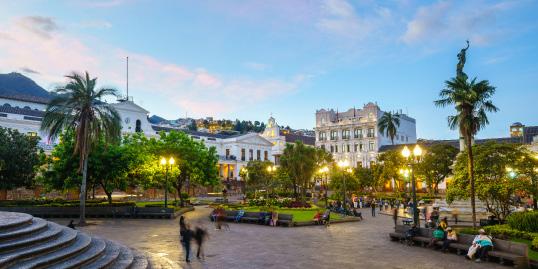
71


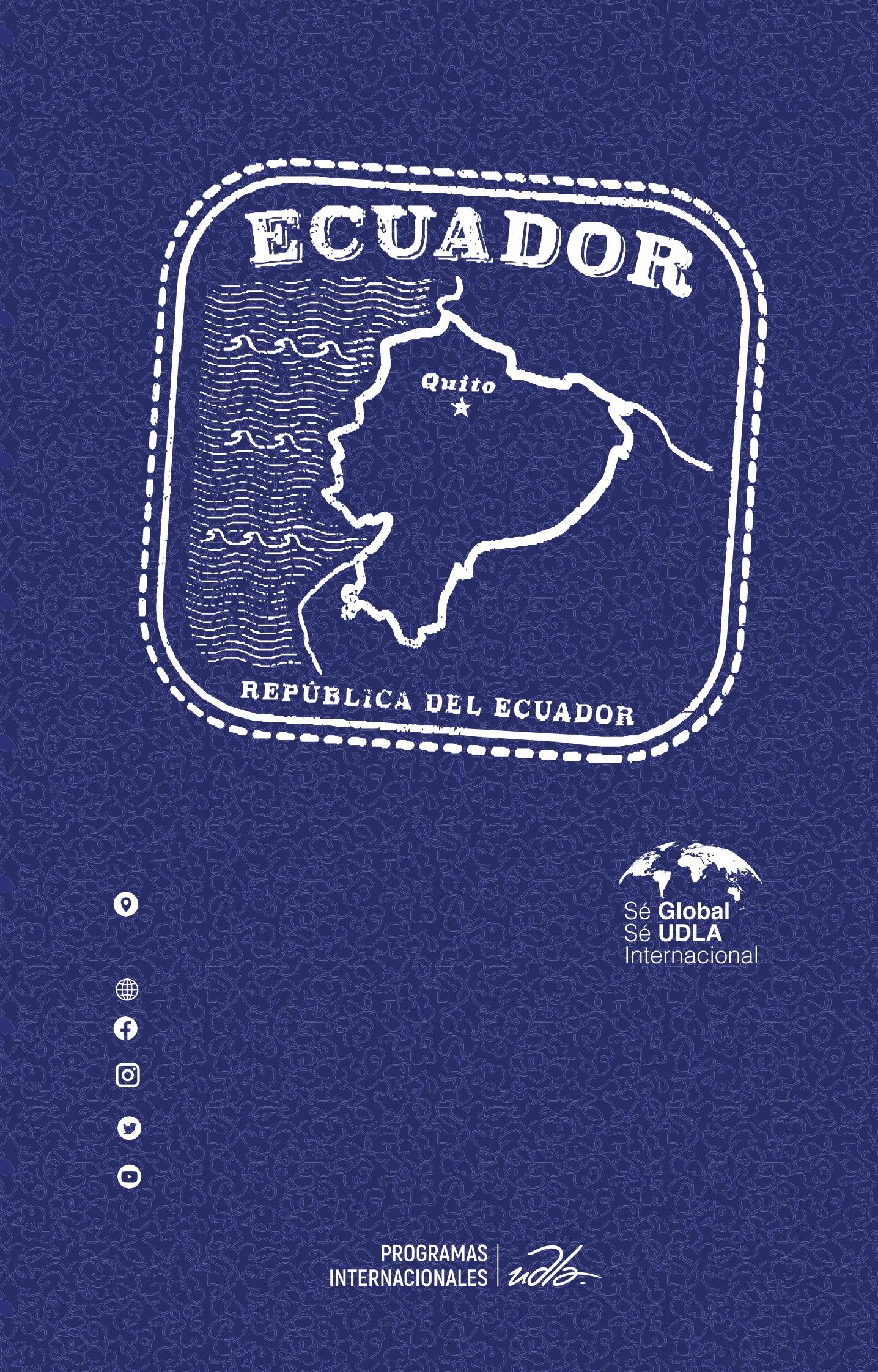
International Programs External Relations Department UDLAPark Campus, First Floor, East Wing. External Relations Department programasinternacionales@udla.edu.ec https://www.udla.edu.ec/app/internacional/ UDLAInternacional @udlainternacional @udlainternacional @udlaint




















































































































